-
AuthorSearch Results
-
December 19, 2024 at 7:59 pm #7700
In reply to: Quintessence: Reversing the Fifth
Elara — December 2021
Taking a few steps back in order to see if the makeshift decorations were evenly spaced, Elara squinted as if to better see the overall effect, which was that of a lopsided bare branch with too few clove studded lemons. Nothing about it conjured up the spirit of Christmas, and she was surprised to find herself wishing she had tinsel, fat garlands of red and gold and green and silver tinsel, coloured fairy lights and those shiny baubles that would sever your toe clean off if you stepped on a broken one.
It’s because I can’t go out and buy any, she told herself, I hate tinsel.
It was Elara’s first Christmas in Tuscany, and the urge to have a Christmas tree had been unexpected. She hadn’t had a tree or decorated for Christmas for as long as she could remember, and although she enjoyed the social gathering with friends, she resented the forced gift exchange and disliked the very word festive.
The purchase of the farmhouse and the move from Warwick had been difficult, with the pandemic in full swing but a summer gap in restrictions had provided a window for the maneuvre. Work on the house had been slow and sporadic, but the weather was such a pleasant change from Warwick, and the land extensive, so that Elara spent the first months outside.
The solitude was welcome after the constant demands of her increasingly senile older sister and her motley brood of diverse offspring, and the constant dramas of the seemingly endless fruits of their loins. The fresh air, the warm sun on her skin, satisfying physical work in the garden and long walks was making her feel strong and able again, optimistic.
England had become so depressing, eating away at itself in gloom and loathing, racist and americanised, the corner pubs all long since closed and still boarded up or flattened to make ring roads around unspeakably grim housing estates and empty shops, populated with grey Lowry lives beetling around like stick figures, their days punctuated with domestic upsets both on their telly screens and in their kitchens. Vanessa’s overabundant family and the lack of any redeeming features in any of them, and the uninspiring and uninspired students at the university had taken its toll, and Elara became despondent and discouraged, and thus, failed to see any hopeful signs.
When the lockdown happened, instead of staying in contact with video calls, she did the opposite, and broke off all contact, ignoring phone calls, messages and emails from Vanessa’s family. The almost instant tranquility of mind was like a miracle, and Elara wondered why it had never occurred to her to do it before. Feeling so much better, Elara extended the idea to include ignoring all phone calls and messages, regardless of who they were. She attended to those regarding the Tuscan property and the sale of her house in Warwick.
The only personal messages she responded to during those first strange months of quarantine were from Florian. She had never met him in person, and the majority of their conversations were about shared genealogy research. The great thing about family ancestors, she’d once said to him, Is that they’re all dead and can’t argue about anything.
Christmas of December, 2021, and what a year it had been, not just for Elara, but for everyone. The isolation and solitude had worked well for her. She was where she wanted to be, and happy. She was alone, which is what she wanted.
If only I had some tinsel though.
December 4, 2024 at 11:58 pm #7644In reply to: Quintessence: Reversing the Fifth
From Decay to Birth: a Map of Paths and Connections
7. Darius’s Encounter (November 2024)
Moments before the reunion with Lucien and his friends, Darius was wandering the bouquinistes along the Seine when he spotted this particular map among a stack of old prints. The design struck him immediately—the spirals, the loops, the faint shimmer of indigo against yellowed paper.
He purchased it without hesitation. As he would examine it more closely, he would notice faint marks along the edges—creases that had come from a vineyard pin, and a smudge of red dust, from Catalonia.
When the bouquiniste had mentioned that the map had come from a traveler passing through, Darius had felt a strange familiarity. It wasn’t the map itself but the echoes of its journey— quiet connections he couldn’t yet place.
6. Matteo’s Discovery (near Avignon, Spring 2024)
The office at the edge of the vineyard was a ruin, its beams sagging and its walls cracked. Matteo had wandered in during a quiet afternoon, drawn by the promise of shade and a moment of solitude.
His eyes scanned the room—a rusted typewriter, ledgers crumbling into dust, and a paper pinned to the wall, its edges curling with age. Matteo stepped closer, pulling the pin free and unfolding what turned out to be a map.
Its lines twisted and looped in ways that seemed deliberate yet impossible to follow. Matteo traced one path with his finger, feeling the faint grooves where the ink had sunk into the paper. Something about it unsettled him, though he couldn’t say why.
Days later, while sharing a drink with a traveler at the local inn, Matteo showed him the map.
“It’s beautiful,” the traveler said, running his hand over the faded indigo lines. “But it doesn’t belong here.”
Matteo nodded. “Take it, then. Maybe you’ll figure it out.”
The traveler left with the map that night, and Matteo returned to the vineyard, feeling lighter somehow.
5. From Hand to Hand (1995–2024)
By the time Matteo found it in the spring of 2024, the map had long been forgotten, its intricate lines dulled by dust and time.
2012: A vineyard owner near Avignon purchased it at an estate sale, pinning it to the wall of his office without much thought.
2001: A collector in Marseille framed it in her study, claiming it was a lost artifact of a secret cartographer society, though she later sold it when funds ran low.
1997: A scholar in Barcelona traded an old atlas for it, drawn to its artistry but unable to decipher its purpose.
The map had passed through many hands over the previous three decades and each owner puzzling over, and finally adding their own meaning to its lines.
4. The Artist (1995)
The mapmaker was a recluse, known only as Almadora to the handful of people who bought her work. Living in a sunlit attic in Girona, she spent her days tracing intricate patterns onto paper, claiming to chart not geography but connections.
“I don’t map what is,” she once told a curious buyer. “I map what could be.”
In 1995, Almadora began work on the labyrinthine map. She used a pale paper from Girona and indigo ink from India, layering lines that seemed to twist and spiral outward endlessly. The map wasn’t signed, nor did it bear any explanations. When it was finished, Almadora sold it to a passing merchant for a handful of coins, its journey into the world beginning quietly, without ceremony.
3. The Ink (1990s)
The ink came from a different path altogether. Indigo plants, or aviri, grown on Kongarapattu, were harvested, fermented, and dried into cakes of pigment. The process was ancient, perfected over centuries, and the resulting hue was so rich it seemed to vibrate with unexplored depth.
From the harbour of Pondicherry, this particular batch of indigo made its way to an artisan in Girona, who mixed it with oils and resins to create a striking ink. Its journey intersected with Amei’s much later, when remnants of the same batch were used to dye textiles she would work with as a designer. But in the mid-1990s, it served a singular purpose: to bring a recluse artist’s vision to life.
2. The Paper (1980)
The tree bore laughter and countless other sounds of nature and passer-by’s arguments for years, a sturdy presence, unwavering in a sea of shifting lives. Even after the farmhouse was sold, long after the sisters had grown apart, the tree remained. But time is merciless, even to the strongest roots.
By 1979, battered by storms and neglect, the great tree cracked and fell, its once-proud form reduced to timber for a nearby mill.
The tree’s journey didn’t end in the mill; it transformed. Its wood was stripped, pulped, and pressed into paper. Some sheets were coarse and rough, destined for everyday use. But a few, including one particularly smooth and pale sheet, were set aside as high-quality stock for specialized buyers.
This sheet traveled south to Catalonia, where it sat in a shop in Girona for years, its surface untouched but full of potential. By the time the artist found it in the mid-1990s, it had already begun to yellow at the edges, carrying the faint scent of age.
1. The Seed (1950s)
It began in a forgotten corner of Kent, where a seed took root beneath a patch of open sky. The tree grew tall and sprawling over decades, its branches a canopy for birds and children alike. By 1961, it had become the centerpiece of the small farmhouse where two young sisters, Vanessa and Elara, played beneath its shade.
“Elara, you’re too slow!” Vanessa called, her voice sharp with mock impatience. Elara, only six years old, trailed behind, clutching a wooden stick she used to scratch shapes into the dirt. “I’m making a map!” she announced, her curls bouncing as she ran to catch up.
Vanessa rolled her eyes, already halfway up the tree’s lowest branch. “You and your maps. You think you’re going somewhere?”
November 12, 2024 at 8:00 pm #7592In reply to: The Incense of the Quadrivium’s Mystiques
The inefficiency of the Quadrivium had been obvious from the start, but the solution was becoming clear to Cromwell. First, the witches needed an extended holiday, a sabbatical. They had become jaded, and unfocused. While they were away, he would put some of his own clerks and auditors in to sort everything out. Before the witches returned, he intended to separate the financial side of the enterprise from the creative side, retaining his own staff for the business side. The creative spellworkers need never hear another word about profits or sales.
Malove needed a holiday too, but he would need to keep her physical presence to enable him to use it. Perhaps once he had his own staff in place and had made arrangements for them to communicate directly with him, he could dispense with the body of Malove and send her away too.
November 6, 2024 at 9:35 pm #7588In reply to: The Incense of the Quadrivium’s Mystiques
All their owls screeched at the same time across the vast distances separating them.
Malové’s voice on them. “I just got off the phone with the Headwitch of Salem. Witch hunting season is back on, can you believe it? Didn’t we have countermeasures in place? Who was in charge of the Lump thwarting warting spell? Come at once!”
In Limerick, Finnley snickered, only mildly annoyed at the sound of all the parked owls in the mostly empty Quadrivium building. Oh, I see. It’s all gone pear-shaped, has it? Witch hunting season indeed! You’d think by now they’d have sorted their spells and counter-spells like a proper orderly lot. Honestly, if it were up to me, I’d have those countermeasures filed, organized, and triple-checked like my cleaning supplies. As for whoever’s in charge of the “Lump thwarting warting spell”—sounds like someone needs a good talking-to. Probably spent too much time nattering about and not enough focusing on their spellwork. Typical, isn’t it?
Elsewhere in the Northern forest, Eris shrugged at the sound hooting echoing. “When I told them something was wrong with Malové, it was her charge all along. Now, let’s wait and see to find someone brave enough to say it to her face.”
Somewhere and somewhen else, Truella and Frella and Jeezel were probably thinking the same, unless they got lost themselves in the Well of Crom, a surefire way to stay clear of Malové’s screeching owls.
August 28, 2024 at 6:26 am #7548In reply to: The Elusive Samuel Housley and Other Family Stories
Elton Marshall’s
Early Quaker Emigrants to USA.
The earliest Marshall in my tree is Charles Marshall (my 5x great grandfather), Overseer of the Poor and Churchwarden of Elton. His 1819 gravestone in Elton says he was 77 years old when he died, indicating a birth in 1742, however no baptism can be found.
According to the Derbyshire records office, Elton was a chapelry of Youlgreave until 1866. The Youlgreave registers date back to the mid 1500s, and there are many Marshalls in the registers from 1559 onwards. The Elton registers however are incomplete due to fire damage.
While doing a google books search for Marshall’s of Elton, I found many American family history books mentioning Abraham Marshall of Gratton born in 1667, who became a Quaker aged 16, and emigrated to Pennsylvania USA in 1700. Some of these books say that Abraham’s parents were Humphrey Marshall and his wife Hannah Turner. (Gratton is a tiny village next to Elton, also in Youlgreave parish.)
Abraham’s son born in USA was also named Humphrey. He was a well known botanist.
Abraham’s cousin John Marshall, also a Quaker, emigrated from Elton to USA in 1687, according to these books.
(There are a number of books on Colonial Families in Pennsylvania that repeat each other so impossible to cite the original source)
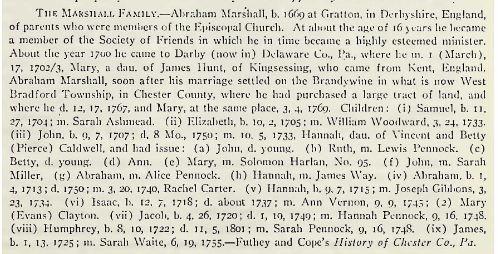
In the Youlgreave parish registers I found a baptism in 1667 for Humphrey Marshall son of Humphrey and Hannah. I didn’t find a baptism for Abraham, but it looks as though it could be correct. Abraham had a son he named Humphrey. But did it just look logical to whoever wrote the books, or do they know for sure? Did the famous botanist Humphrey Marshall have his own family records? The books don’t say where they got this information.
An earlier Humphrey Marshall was baptised in Youlgreave in 1559, his father Edmund. And in 1591 another Humphrey Marshall was baptised, his father George.
But can we connect these Marshall’s to ours? We do have an Abraham Marshall, grandson of Charles, born in 1792. The name isn’t all that common, so may indicate a family connection. The villages of Elton, Gratton and Youlgreave are all very small and it would seem very likely that the Marshall’s who went the USA are related to ours, if not brothers, then probably cousins.
Derbyshire Quakers
In “Derbyshire Quakers 1650-1761” by Helen Forde:
“… Friends lived predominantly in the northern half of the country during this first century of existence. Numbers may have been reduced by emigration to America and migration to other parts of the country but were never high and declined in the early eighteenth century. Predominantly a middle to lower class group economically, Derbyshire Friends numbered very few wealthy members. Many were yeoman farmers or wholesalers and it was these groups who dominated the business meetings having time to devote themselves to the Society. Only John Gratton of Monyash combined an outstanding ministry together with an organising ability which brought him recognition amongst London Friends as well as locally. Derbyshire Friends enjoyed comparatively harmonious relations with civil and Anglican authorities, though prior to the Toleration Act of 1639 the priests were their worst persecutors…..”
Also mentioned in this book: There were monthly meetings in Elton, as well as a number of other nearby places.
John Marshall of Elton 1682/3 appears in a list of Quaker emigrants from Derbyshire.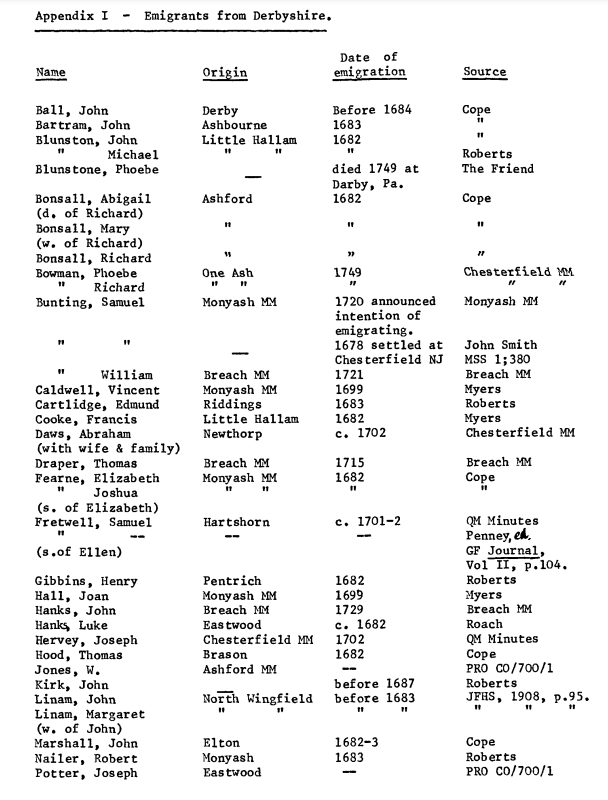
The following image is a page from the 1753 book on the sufferings of Quakers by Joseph Besse as an example of some of the persecutions of Quakers in Derbyshire in the 1600s:
A collection of the sufferings of the people called Quakers, for the testimony of a good conscience from the time of their being first distinguished by that name in the year 1650 to the time of the act commonly called the Act of toleration granted to Protestant dissenters in the first year of the reign of King William the Third and Queen Mary in the year 1689 (Volume 1)
Besse, Joseph. 1753Note the names Margaret Marshall and Anne Staley. This book would appear to contradict Helen Forde’s statement above about the harmonious relations with Anglican authority.
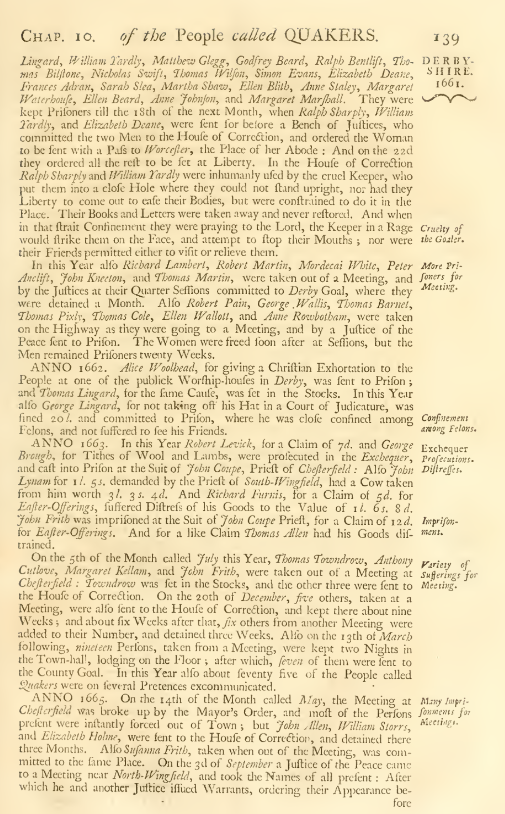
The Botanist
Humphry Marshall 1722-1801 was born in Marshallton, Pennsylvania, the son of the immigrant from Elton, Abraham Marshall. He was the cousin of botanists John Bartram and William Bartram. Like many early American botanists, he was a Quaker. He wrote his first book, A Few Observations Concerning Christ, in 1755.
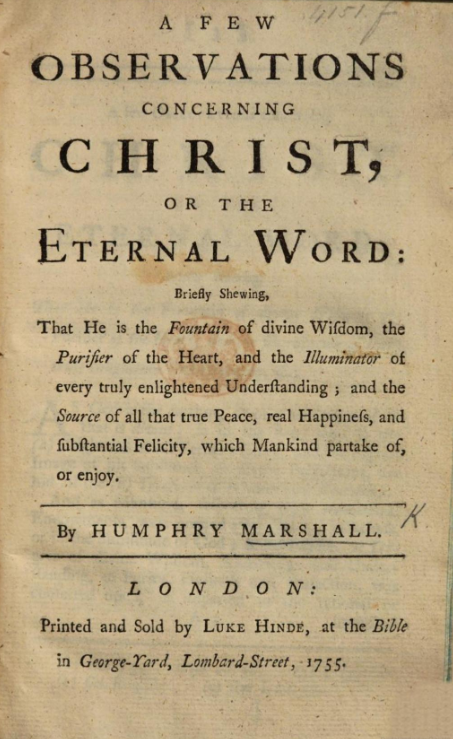
In 1785, Marshall published Arbustrum Americanum: The American Grove, an Alphabetical Catalogue of Forest Trees and Shrubs, Natives of the American United States (Philadelphia).
Marshall has been called the “Father of American Dendrology”.
A genus of plants, Marshallia, was named in honor of Humphry Marshall and his nephew Moses Marshall, also a botanist.
In 1848 the Borough of West Chester established the Marshall Square Park in his honor. Marshall Square Park is four miles east of Marshallton.
via Wikipedia.
From The History of Chester County Pennsylvania, 1881, by J Smith Futhey and Gilbert Cope:
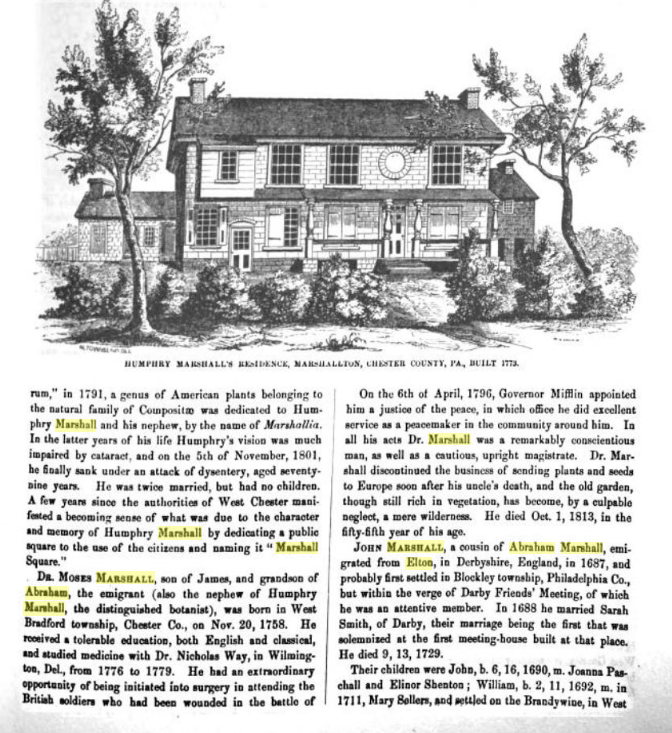
From The Chester Country History Center:
“Immediately on the Receipt of your Letter, I ordered a Reflecting Telescope for you which was made accordingly. Dr. Fothergill had since desired me to add a Microscope and Thermometer, and will
pay for the whole.’– Benjamin Franklin to Humphry, March 18, 1770
“In his lifetime, Humphry Marshall made his living as a stonemason, farmer, and miller, but eventually became known for his contributions to astronomy, meteorology, agriculture, and the natural sciences.
In 1773, Marshall built a stone house with a hothouse, a botanical laboratory, and an observatory for astronomical studies. He established an arboretum of native trees on the property and the second botanical garden in the nation (John Bartram, his cousin, had the first). From his home base, Humphry expanded his botanical plant exchange business and increased his overseas contacts. With the help of men like Benjamin Franklin and the English botanist Dr. John Fothergill, they eventually included German, Dutch, Swedish, and Irish plant collectors and scientists. Franklin, then living in London, introduced Marshall’s writings to the Royal Society in London and both men encouraged Marshall’s astronomical and botanical studies by supplying him with books and instruments including the latest telescope and microscope.
Marshall’s scientific work earned him honorary memberships to the American Philosophical Society and the Philadelphia Society for Promoting Agriculture, where he shared his ground-breaking ideas on scientific farming methods. In the years before the American Revolution, Marshall’s correspondence was based on his extensive plant and seed exchanges, which led to further studies and publications. In 1785, he authored his magnum opus, Arbustum Americanum: The American Grove. It is a catalog of American trees and shrubs that followed the Linnaean system of plant classification and was the first publication of its kind.”
 August 21, 2024 at 12:27 pm #7546
August 21, 2024 at 12:27 pm #7546In reply to: The Elusive Samuel Housley and Other Family Stories
The Potters of Darley Bridge
Rebecca Knowles 1745-1823, my 5x great grandmother, married Charles Marshall 1742-1819, the churchwarden of Elton, in Darley, Derbyshire, in 1767. Rebecca was born in Darley in 1745, the youngest child of Roger Knowles 1695-1784, and Martha Potter 1702?-1772.
Although Roger and Martha were both from Darley, they were married in South Wingfield by licence in 1724. Roger’s occupation on the marriage licence was lead miner. (Lead miners in Derbyshire at that time usually mined their own land.) Jacob Potter signed the licence so I assumed that Jacob Potter was her father.
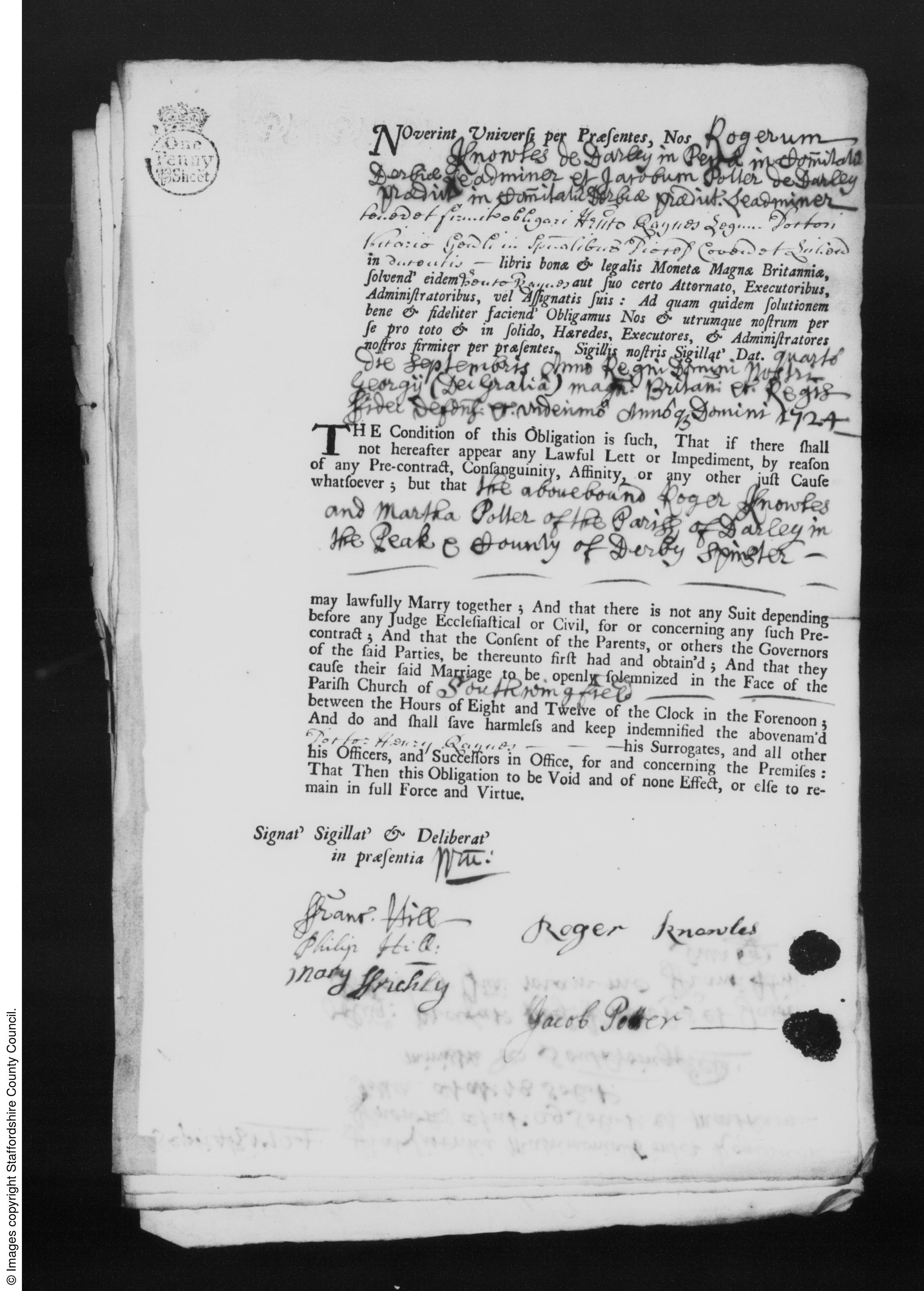
I then found the will of Jacobi Potter who died in 1719. However, he signed the will James Potter. Jacobi is latin for James. James Potter mentioned his daughter Martha in his will “when she comes of age”. Martha was the youngest child of James. James also mentioned in his will son James AND son Jacob, so there were both James’s and Jacob’s in the family, although at times in the documents James is written as Jacobi!
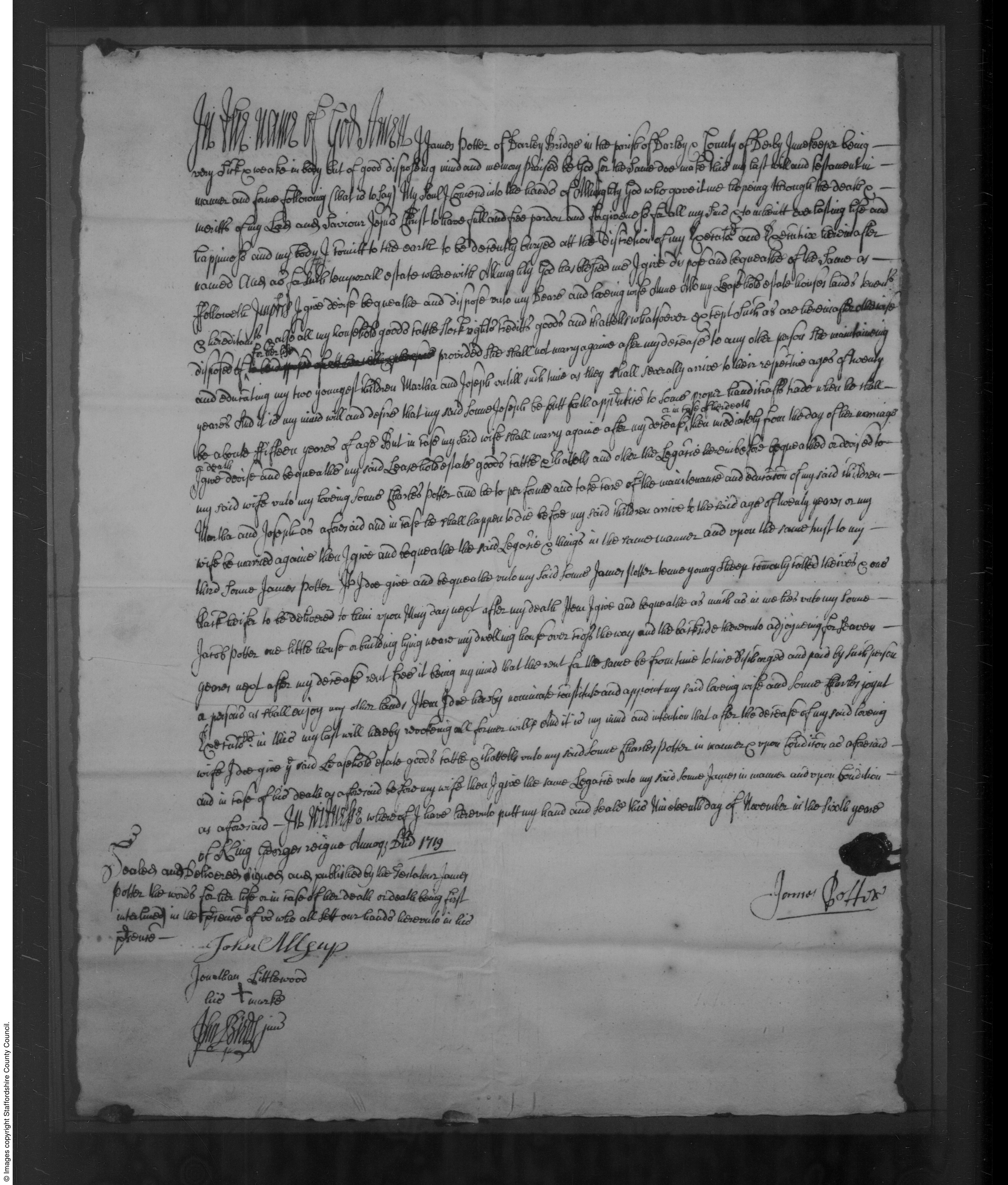
Jacob Potter who signed Martha’s marriage licence was her brother Jacob.
Martha’s brother James mentioned his sister Martha Knowles in his 1739 will, as well as his brother Jacob and his brother Joseph.
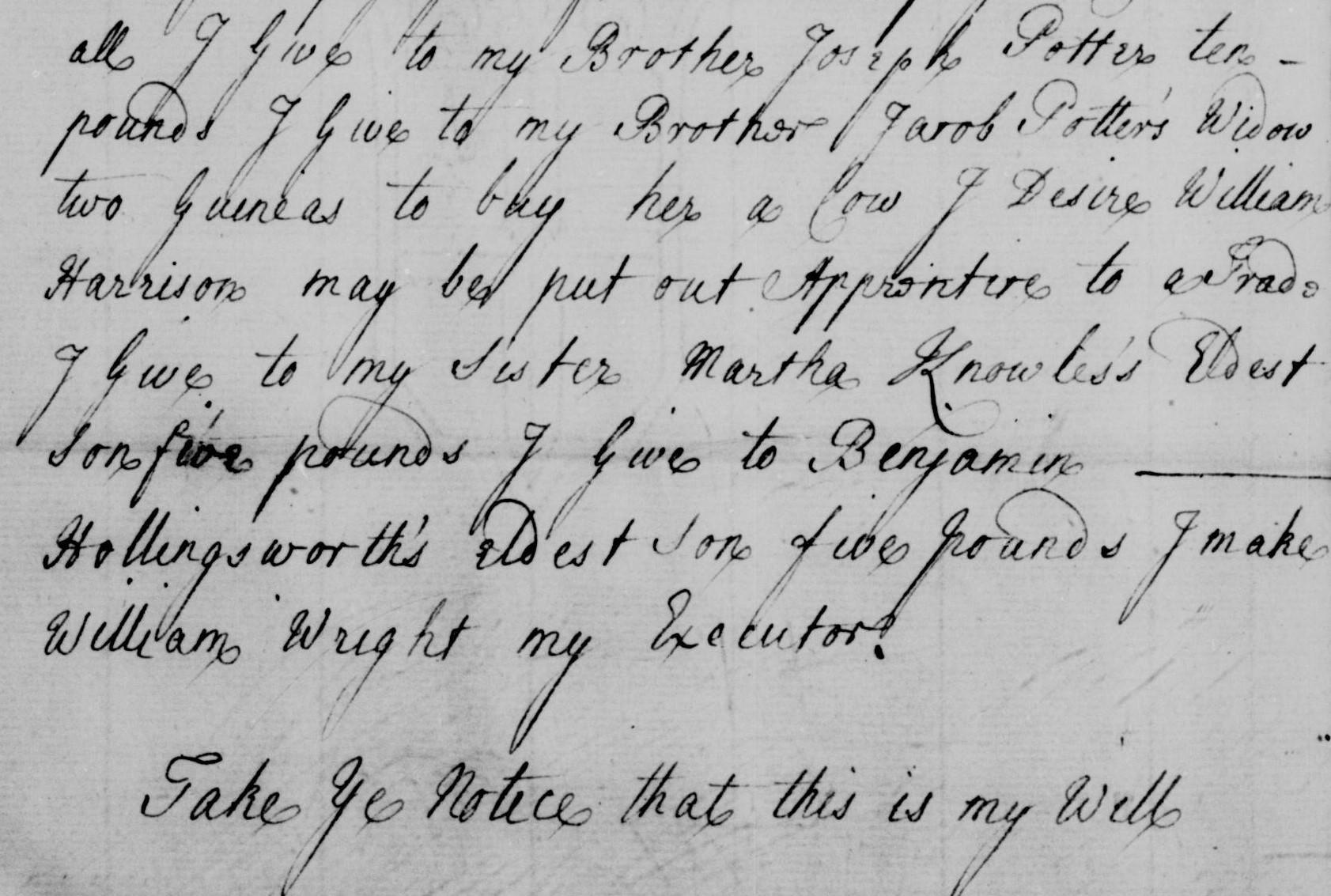
Martha’s father James Potter mentions his wife Ann in his 1719 will. James Potter married Ann Waterhurst in 1690 in Wirksworth, some seven miles from Darley. James occupation was innkeeper at Darley Bridge.
I did a search for Waterhurst (there was only a transcription available for that marriage, not a microfilm) and found no Waterhursts anywhere, but I did find many Warhursts in Derbyshire. In the older records, Warhust is also spelled Wearhurst and in a number of other ways. A Martha Warhurst died in Peak Forest, Derbyshire, in 1681. Her husbands name was missing from the deteriorated register pages. This may or may not be Martha Potter’s grandmother: the records for the 1600s are scanty if they exist at all, and often there are bits missing and illegible entries.
The only inn at Darley Bridge was The Three Stags Heads, by the bridge. It is now a listed building, and was on a medieval packhorse route. The current building was built in 1736, however there is a late 17th century section at rear of the cross wing. The Three Stags Heads was up for sale for £430,000 in 2022, the closure a result of the covid pandemic.

Another listed building in Darley Bridge is Potters Cottage, with a plaque above the door that says “Jonathan and Alice Potter 1763”. Jonathan Potter 1725-1785 was James grandson, the son of his son Charles Potter 1691-1752. His son Charles was also an innkeeper at Darley Bridge: James left the majority of his property to his son Charles.
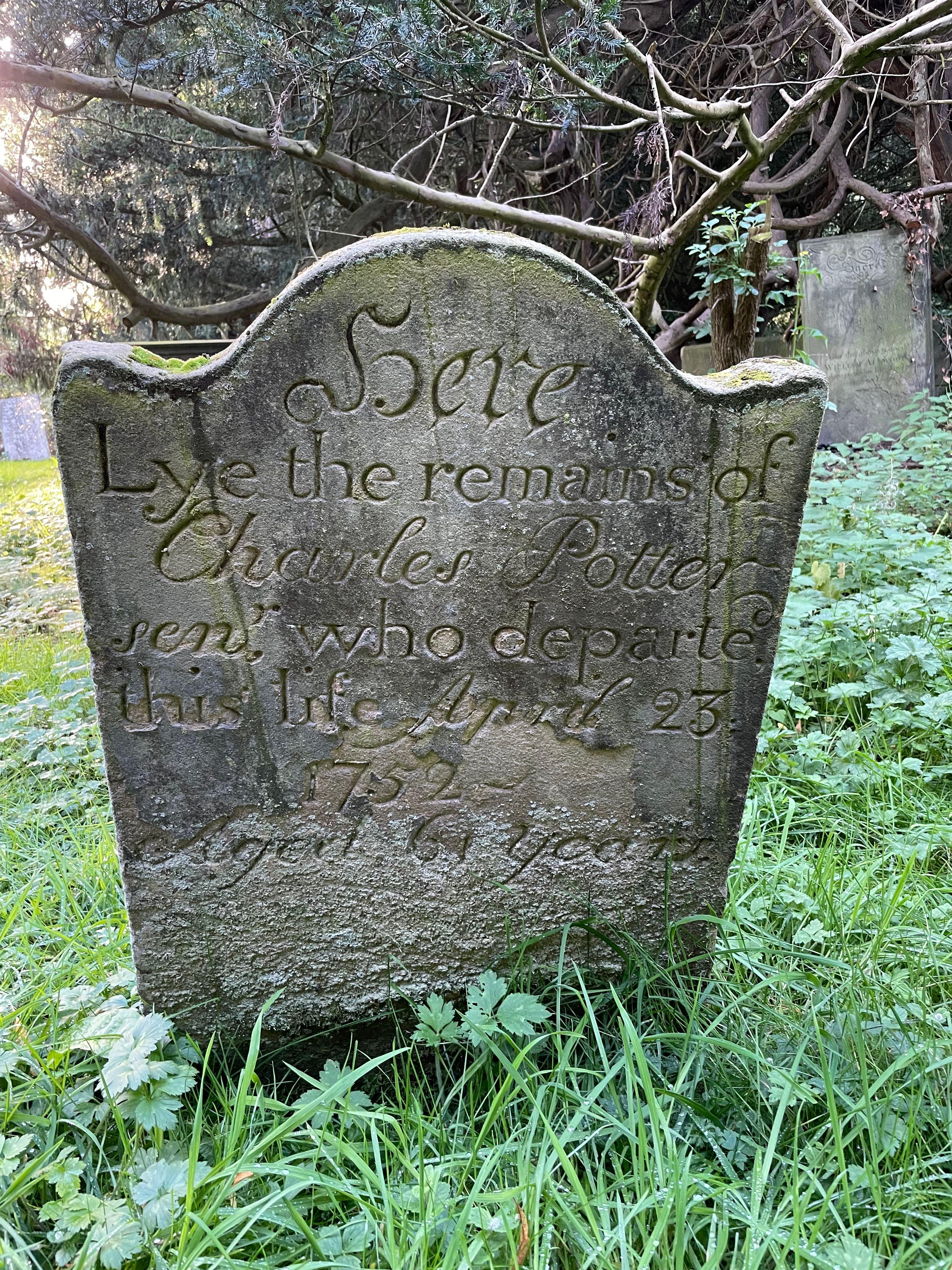
Charles is the only child of James Potter that we know the approximate date of birth, because his age was on his grave stone. I haven’t found any of their baptisms, but did note that many Potters were baptised in non conformist registers in Chesterfield.
Potters Cottage
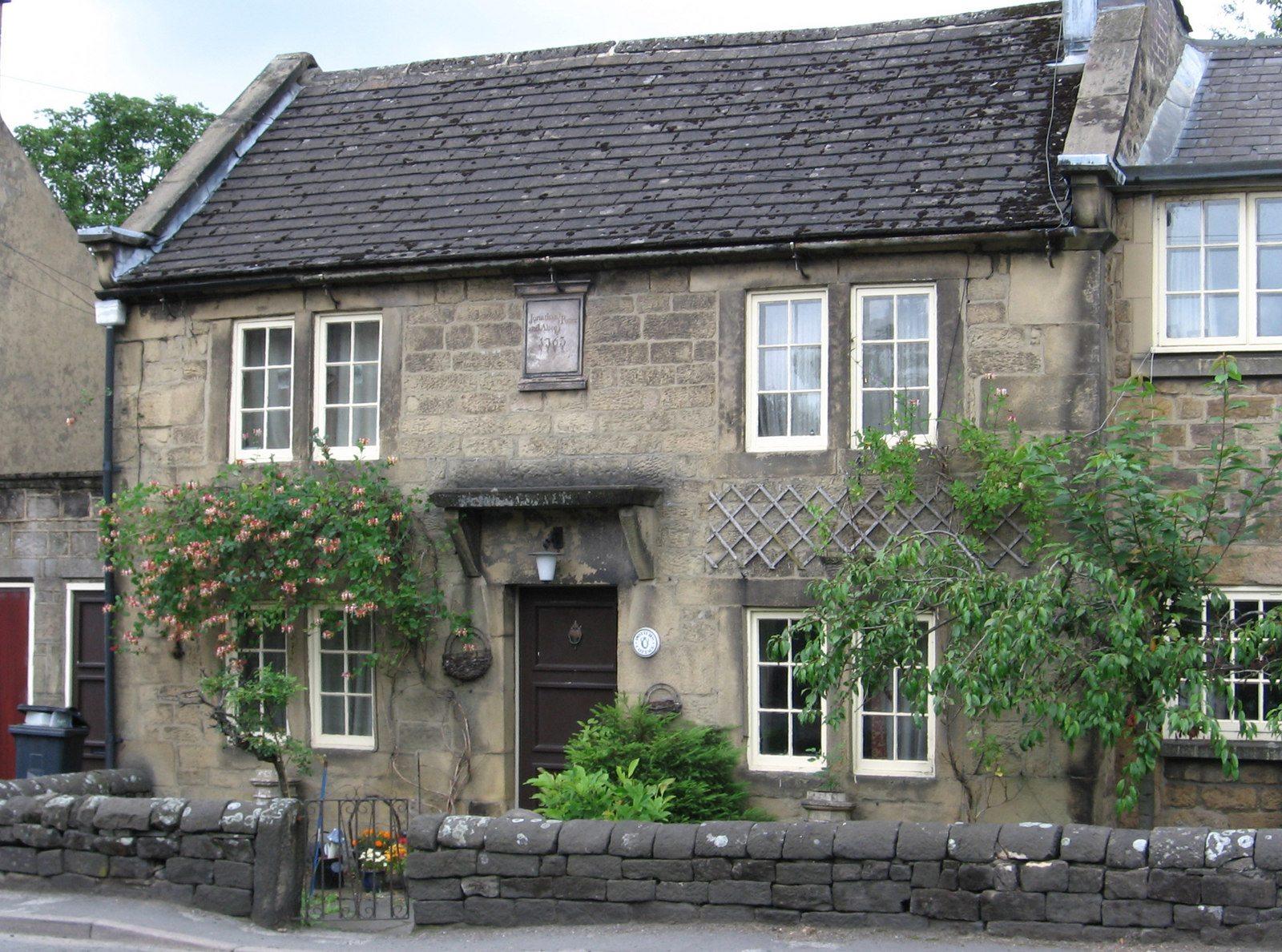
Jonathan Potter of Potters Cottage married Alice Beeley in 1748.
“Darley Bridge was an important packhorse route across the River Derwent. There was a packhorse route from here up to Beeley Moor via Darley Dale. A reference to this bridge appears in 1504… Not far to the north of the bridge at Darley Dale is Church Lane; in 1635 it was known as Ghost Lane after a Scottish pedlar was murdered there. Pedlars tended to be called Scottish only because they sold cheap Scottish linen.”
via Derbyshire Heritage website.
According to Wikipedia, the bridge dates back to the 15th century.
June 14, 2024 at 6:26 am #7473In reply to: The Incense of the Quadrivium’s Mystiques
What the disgruntled witches of the Quadrivium hadn’t considered was that the witches of the Quintessivium Cloister Crafts weren’t happy about the merger either. They were not happy with their leader either, but had progressed towards a takeover considerably more than the floundering dissatisfied Quadrivium members. A gaggle of strangers about the place, and the attention of the supervisors during the process of merging, was the last thing they needed at this delicate stage. Sassafras Bentley in particular was worried, more alarmed than the others, for she had another secret investigation under way as well as the revolt.
Sassafras hadn’t been sleeping well. Not only did she have to cover her tracks from the others and the administration, she now had to ensure none of the nosy witches from the other coven chanced on her preliminary findings. It had taken so long to get to this stage, and she was at a crucial point of revelation. But not only did Sassafras have to maintain the utmost secrecy, she had to get her colleagues to help her conceal it ~ but without telling them what it was or why they had to keep it quiet.
It would help if there was someone she could trust to help her. But who? The other witches were a dizzy shallow lot, more interested in showy spells and those tawdry crafts and sales. The only reason they’d been moved to start a rebellion was because they wanted a bigger slice of the pie: too much was being creamed off by the top brass, and they wanted more attention for themselves, too. The fact of the matter was that Sassafras had only joined the coven because of the location of the headquarters. True, she had dabbled in witchcraft, cast a few spells, but in her own way. She didn’t naturally gravitate to team work with all its problems ~ not least, all the other people that one had to put up with. But it was an extremely useful way for her to fully explore the location, and gave her many opportunities to walk on her own in the woods, ostensibly gathering plants for the spells and potions.
A group from the Quadrivium were expected to come and stay over the weekend. Sassafras didn’t have much time to hatch a plan, but the urgency was clouding her brain, rendering her incapable of thinking clearly. It was an interruption. She needed ~ and wanted ~ to think about the discoveries, not worry about this unsettling development. Maybe she would just have to play it by ear when they came.
June 12, 2024 at 8:55 pm #7471In reply to: The Incense of the Quadrivium’s Mystiques
Looking at the news, Truella had started to push messages into the group’s channel. Frigella, Jeezel, and Eris were unusually quick to answer.
Truella: (rolling her eyes icon) “So, Austreberthe’s brilliant plan is to merge our sophisticated incense business with… what was it again? Puffer coats and kilts made by Spanish witch nuns? I honestly can’t wait to see how that plays out.”
Frigella: (smirking) “Oh, don’t forget the quills. How could we possibly survive without those finely crafted quills? I mean, who needs innovation in magic when you can have a hand-stitched quilt from a nun’s workshop?”
Jeezel: (chuckling) “I can see it now—our next product line: ‘Blessed Be the Quilted Puffer Coats.’ Perfect for those chilly nights when you’re out casting spells in the woods. Truly revolutionary.”
Truella: “Yes, and let’s not overlook the cultural synergy. Religious Spanish nuns known to overdo the religious stuff, merging with our… less-than-conventional coven. A match made in heaven, for sure.”
Jeezel: “I can already hear Austreberthe’s sales pitch. ‘Introducing the new line of enchanted apparel—each item blessed with a dash of piety and a sprinkle of old-world charm. Because nothing says cutting-edge magic like a quilted kilt.'”
Frigella: “And the quills! ‘Handcrafted by the devout sisters, these quills will not only enhance your writing but also keep your soul in line.’ Imagine the marketing campaigns!”
Jeezel: “It’s like we’re stepping back into the Middle Ages. What’s next? A line of chastity belts with magical locks?”
Frigella: “I get that Austreberthe is trying to diversify and all, but does she really think this will integrate seamlessly with our brand? We’ve built our reputation on unique, powerful incense blends. How do quills and coats fit into that?”
Jeezel: (looking for the snorting icon) “Don’t forget the puffer coats. Perfect for those who wish to repent in style.”
Eris not wanting to sound too sycophantic, and trying to remain optimistic considering it was after all part of all the potential business she’d looked into: “Well, it seemed like a good idea in the beginning. You should have seen what we avoided! Plus, they have a solid balance sheet, believe it on not, I’m sure that’s what got Austreberthe. I knew Malové had her reservations, but before she left, she pushed hard for it, so maybe there’s some hidden genius in this we just can’t see yet. And Austreberthe will have a cunning plan to fuse these disparate elements into something… cohesive.”
Truella: (raising an eyebrow) “Cohesive like a patched-up quilt, you mean? I suppose we’ll have to wait and see if this grand vision of hers is a stroke of genius or just… well, a stroke.”
April 27, 2024 at 6:28 pm #7440In reply to: The Incense of the Quadrivium’s Mystiques
“Not another one!” exclaimed Truella. “Another time and money wasting conference in another bloody castle!”
Eris sighed. “It’s a party, a birthday party, not a conference. You know, one of those fun things that people do for entertainment.”
“If Malove planned it there is bound to be a catch. It’s another money making pushy sales thing, I bet.”
“Actually,” Frella ventured timidly, “You’re right, it’s not just a birthday party.”
“How would you know?” Jez was blunt.
Frella stammered nervously, “Well I, er, I overheard a snatch of conversation, you see…”
Jeezel gave her a piercing look and said “And? What did you overhear?”
“Something about the pink spider. We have to find it for some reason, before the others do. Well of course Malove was going to tell us,” Frella rolled her eyes at Truella, “But not until we got there, at the last minute. And no, I don’t know why. And I don’t know what the pink spider is, either. But maybe we can find out before we get there.”
“What’s the castle and where is it?” asked Truella.
“It’s the Flossy Liar Chateau,” replied Eris, “In France somewhere. Maybe you can find out some of the history, Tru. Frella, do some research on the botanical garden. And Jez, the costumes…”
“Getting a bit bossy, aint she,” Jez said to nobody in particular, and to Eris she asked sweetly, “And you, dear? What will you be researching?”
“Why, the legends of witchcraft, obviously. There are bound to be some legends and witchcraft.”
April 17, 2024 at 8:09 pm #7434In reply to: The Incense of the Quadrivium’s Mystiques
Getting this out in the room did bring a tide of emotions; pent-up frustration, indignation, bits of bruised egoes, the whole spectrum. Truella’s tirade had managed to uncork a complete bundle of electricity in the atmosphere, but the genie had left the building.
Eris had suddenly felt like scrambling away, but had stayed along with spaced out Frigella and Jeezel as she’d felt a pang of responsibility.
Surprisingly, Malové had remained composed throughout the heated ensuing exchanges, trying to be constructive at every turn, and managing to conclude most of the debates —even when was not fully settled, and by far, a round of collected feedback afterwards, she’d clapped appreciatively saying. “Congratulations team, seeing how we are no longer covertly disagreeing behind everyone else’s back, I can see improvement in our functioning as a cohesive Coven. Believe it or not, being in a place to openly voice disagreement is a sign of progress, we’ve moved past the trust issues, into constructive conflict. There is still much to be done to commit, be accountable and focus on results together, but I feel we are on track to a brighter future, you’ve all done well.”
Back in her cottage in Finland, Eris was wondering “then why do I feel so bloody exhausted…”
She played back in her head some of the comments that Malové had shared in private after, when Eris had enquired if there would be some consequences for her witch’s friend actions. Once more, Malové has shown a unusual restraint that had put her worries at ease for now.
“Truella’s actions during the Adare Manor workshop presentation displayed boldness and conviction, two qualities that are essential for any individual, executive or otherwise, who wishes to effect change within an organization or a venture. Standing up for oneself is not only about self-assurance; it’s about ensuring that your voice and perspective are heard and considered.
However, the manner in which one stands up for oneself is crucial. Berating others, especially in a public forum such as a workshop presentation, can be counterproductive. It can create resistance and diminish the opportunity for constructive dialogue. While I understand her frustration, it is important to channel such energies towards a more strategic approach that fosters collaboration and leads to solutions.
As a leader, I advocate for clear communication and assertiveness, tempered with respect for all members of the coven. The success of our ventures, vaping or otherwise, depends on our ability to work cohesively towards our common goals. Truella’s passion is commendable, but it must be directed appropriately to benefit the coven and our business endeavors.”
She had asked Eris to convey the same to Truella. She’d made no promises —her friend was known to be more difficult to herd than cats. But with time, there would be a chance she would see reason.
Meanwhile, their sales targets had not gone away, and they had to keep the Quadrivium afloat. With Truella checking out of the game, and clearly not overly engaged on results, it fell onto the rest of the team to deliver.
A second session of workshop and celebration was planned in a month’s time in Spain with all top witches. With Eris’ last experience in Spain and her elephant head, she was starting to dread another mishap. Plus, she sighed when she looked at the invite. She would have to fetch a cocktail attire. A vacation was long overdue…
April 13, 2024 at 10:16 am #7433In reply to: The Incense of the Quadrivium’s Mystiques
“Good morning.” Truella started nervously. “Good morning!” she repeated in a more confident tone, remembering her intention, as she scanned all the attentive faces in the audience.
“You are gathered here, my friends, colleagues and competetive others, to hear me talk about new sales channels, market studies, double digit growth, and all the rest of it. But I am not going to talk about that. I am a witch, not a business woman. I am an amateur archaeologist, not a business woman. And I am not a competetive witch.” she added, glaring pointedly at some of the witches in the audience. “And I know nothing about sales and marketing.”
“I am an honest witch! A straightforward well meaning witch with a desire to help others, and that has little to do with marketing and digits, double or otherwise. My words of widsom to you all this day is this: this coven has taken a destructive turn, and it’s time to return to our roots. The timeless duty of the naturally helpful community member with special skills. Not the self serving profit and sales motivated capitalist modern witchery that we see here, with these modern money and time wasting conferences.”
Frella glanced worriedly at Malove, whose face was puce with rage. Truella had avoided looking in the direction of Malove but Frella’s movement caught her eye, and she faltered for a moment before continuing.
“I’m here to tell you, it’s time to take direct action and strike until the leaders of this shambolic institution return to proper and honourable witchy ways.”
A few gasps were heard in the audience, breaking the uncomfortable silence. Then Eris started to clap, quietly and slowly at first but then louder. Others started joining in. Eris and Jez stood up, raising their hands above their heads to clap loudly. Frella remained seated with the baby on her lap, although she held the baby’s hands and patted them together in a show of solidarity. With that, the baby turned into a seal and soon slithered off Frella’s lap and humped off to find the ornamental lake.
“Now, if you’ll excuse me, I have spells to do for the needy ~ for free, as a good witch should.” And with that Truella flounced out of the conference room.
April 12, 2024 at 7:59 pm #7430In reply to: The Incense of the Quadrivium’s Mystiques
“Of course I know,” said Eris, looking worn out by the excess of social interaction, or maybe that was her latest goth make-up. “Have I been the only one paying attention?”
“Shtt, don’t speak too loud, my head is pounding…” Jeezel moaned softly. “And what is happening with us?”
“You haven’t got it, have you? Should I spell it out loud?” Eris glanced sideways, wary of Malové being within earshot. “It was all a test… but I don’t see us getting in the good graces of the Coven with was has transpired so far.”
Truella tugged at Frigella’s sleeve, as she went to refill her plate and had noticed the impromptu discussion which was suspiciously conspirational. Frigella groaned “don’t wake up Yikes, look how cutie pooh he is.”
Truella motioned for them to join Eris and Jeezel, who grimaced at the sight of Truella’s questionable cheese selection. “What’s going on? We want in.”
Eris sighed. “Fine, but not here. Let’s get some fresh air.” As discreetly as a herd of elephant in a dry savanah, they made their way to the terrace, escaping the breakfast room which was getting crowded, to bask in the morning sunlight.
As they settled in, Eris began to explain. “I think it’s a side-effect of my memory spell, that unexpectedly, I still remember most of it.”
“Spill it already, they’re about to close the buffet, and the morning sessions are starting soon, and we can’t be late,” Truella urged, fidgeting impatiently.
“You see, that’s exactly it, Tru’. None of us have been ourselves. And do you really think that baby is a coincidence?” She nodded towards Frigella, who was cooing over the sleeping infant.
“First off, have you noticed, this workshop is meant for the top brass. Only the high-rank witches of the Coven have been invited, and you don’t even think twice about why we’re here. Malové has been setting us to a test amongst her next in line. We’ve been in competition since the start with the other witches, and you didn’t even notice! They were apparently more prepared than us lot. They managed to honeypot Frigella with a baby which I’m pretty sure is nothing more than a transformed rodent. As for Truella, the spell on her must have started on the Octobus; not sure you’ve noticed, but when we stopped on our way to collect the other ones, that’s when she started to get sick and get all sorts of strange cravings.”
“But… what’s the point?” Jeezel asked, still bewildered. “Is that why I can’t get my hair right, and my eye makeup is a disaster, and… and…” She choked back tears.
“These witches are fiercely competitive. And probably less skilled that us, which is why they will not play fair; we’ve got to step up ladies. Otherwise, we’ll be on tuspellware duties for years until some opportunity like that happens again.” Eris was getting fired up, an unusual sight for someone generally mildly interested in office politics.
“Truella!” Eris called out as Truella was starting to gorge on the cornichons she’d piled up next to the fromages assemblage. “You’re presenting in the morning session! Malové is counting on you to update us on the vaping venture… new sales channels, market studies, double-digit growth, you know the drill.”
Truella seemed to snap out of her daze. “Don’t tell me,” Eris sighed, “you forgot… Luckily, I have a memory for all of us, and I brewed some ginkgo potion this morning.” She produced an orange flask with black tea stains around the edges, and poured it into glasses she conjured.
“Now bottoms up, ladies. We’ve got a presentation to nail and some witches to put in their place.”
April 6, 2024 at 11:14 pm #7419In reply to: The Incense of the Quadrivium’s Mystiques
Sleeping like a log through a full night’s rest on the lavender spell wrapped in the rag of the punic tunic worked like a charm. By morning light, Eris had reverted to her normal self again.
How her coven had succeeded in finding the rag was anyone’s guess, but one thing was for certain—Truella’s resourcefulness knew no bounds once she set her mind to a goal. All it took was a location spell, a silencing charm around the area in Libyssa where she wanted to dig, and of course, a trusty trowel. Hundreds of buckets of dirt later, a few sheep’s jawbones and voilà, the rag. Made of asbestos, impervious to fire, and slower to decay than a sloth on a Monday morning, it was nothing short of a miracle it had survived so long underground, and that they found it in such a short time.
Eris rubbed her neck still pained from the weight of bearing that enormous elephantine head.
When pressed by the others—Frigella, Jeezel, and the ever-curious Truella—she could hardly recall what led her to attempt the risky memory spell.
Echo buzzed in with an electric hum, the sprite all too eager to clear the air.
“The memory spell,” Echo interjected, “a dubious cocktail of spirits of remembrance and forgetfulness, was cast not out of folly but necessity. Eris, rooted in her family’s arborestry quests, understood the weight of knowledge passed down through generations. Each leaf and branch in the family tree held stories, secrets, and sacrifices that were both a treasure and a burden.”
Echo smirked as he continued, pointing out the responsibility of the other entity’s guidance. “Elias’s advice had egged her on, resonating with Eris’ desires, and finally enticing her not lament the multitude of options but rather delights in the exploration without the burden of obligation —end of quotation.”
“And was it worth it?” Truella asked impatiently, her curiosity piqued a little nonetheless. She’d always wished she had more memory, but not at the cost of an elephant head.
“Imagine the vast expanse of memories like a grand library, each book brimming with the essence of a lineage. ” Eris said. “To wander these halls without purpose could lead to an overwhelming deluge of ancestral whispers.” She paused. “So, not sure it was entirely worth it. I feel more confused than ever.”
Echo chimed in again “The memory spell was conjured to be a compass, a guide through the storied corridors of her heritage. But, as with all magic, the intentions must be precise, the heart true, and the mind clear. A miscalculation, a stray thought, a moment’s doubt — and the spell turned upon itself, leaving Eris with the visage of an elephant, noble and wise. The elephant head, while unintended, may have been a subconscious manifestation of her quest for familial knowledge. Perhaps the memory spell, in its misfiring, sought to grant Eris the attributes necessary to continue her arborestry quests with the fortitude and insight of the elephant.”
“But why Madrid of all places?” Jeezel asked mostly out of reflex than complete interest; she had been pulled into the rescue and had missed the quarter finals of the Witch Drag Race she was now catching up on x2 speed replay on her phone.
Echo surmised “Madrid, that sun-drenched city of art and history, may have been a waypoint in her journey — a place where the paths of the past intersect with the pulse of the present. It is in such crossroads that one may find hidden keys to unlock the tales etched in one’s bloodline.”
“In other words, you have no idea?” Frigella asked Eris directly, cutting through the little flickering sprite’s mystical chatter.
“I guess it’s something as Wisp said. I must have connected to some bloodlines. But one thing is sure, all was fine when I was in Finland, Thorsten was as much a steadying presence as one would need. But then I got pulled into the vortex, and all bets were off.”
“At least he had the presence of mind to call me.” Truella said smuggly.
“The red cars may have started to get my elephant head mad… I can’t recall all of it, but I’m glad you found me in time.” Eris admitted.
“Don’t mention it poppet, we all screwed up one spell or two in our time.” Frigella said, offering unusual comfort.
“Let’s hope at least you’ll come up with brilliant ideas from that ordeal next week.” said Jeezel.
“What do you mean?” Truella looked at her suspiciously
“The strategic meeting that Malové has called for? In the Adare Manor resort?” Frigella reminded her, rolling her eyes softly.
“Jeez, Jeezel…” was all Truella could come up with. “another one of these boring meetings to boost our sales channels and come up with new incense models?” Truella groaned, already wishing it were over.
“That’s right love. Better be on your A-game for this.” Jeezel said, straightening her wig with a sly grin.
February 21, 2024 at 8:37 pm #7385In reply to: The Incense of the Quadrivium’s Mystiques
In her office at the Quadrivium, tapping her fingers on her mahogany desk to the sound of Los del Río’s Macarena, Malové looked pensively at the meager bounty they’d managed to collect from the rehearsals of the Carnival, and had unexpectedly managed to salvage before they were entangled into the net of power plays of the Elders and its ensuing chaos.
The phial on her desk was the only part they could salvage. They had to use most of it to revive Truella’s duplicated body before jumping back. After they’d come back to Limerick, there didn’t seem to be any lingering side effects from the dip in the red waters on the duplicate Truella.
Malové would have rather expected to witness a surge of nymphomaniac urges from Truella or the others, but there was really no telling how that could turn out; magic spells usually had a natural balance to them. The only suspicious thing was how Frigella after her dip in the waters, seemed to have developed prescience about what plans she had for the hippo carcass back at home. Magic sometimes worked in mysterious ways.
So, just to be sure, she’d tasked Frigella to be the designated driver back home for Truella. In her state of shock, Truella could have botched her merging spell to reintegrate her two bodies into the same location.
Malové wouldn’t have admitted it, but she’d felt a sigh of relief when the SMS of Frigella appeared on her scrying bowl to tell her that the spell had been completed without any ill effect. Well, maybe Truella’s partner would have the time of their lives tonight.On her desk, the leftover liquid of the phial was a deep shade of pulsating violet, and had settled to a softly bubbling state not unlike a lava lamp. It wasn’t clearly the top shelf quality she’d expected, nor even close to the amount they’d need to mass produce some powerful elixir for the infertile, impotent or simply curiously lecherous clients. That line of sexual healing incenses would have to wait for a more suitable conjonction of stars.
For now, the only new collection that the season allowed for was mostly smell of rain-soaked earth. She hated it. Not just because of its run-of-the-mill smoke flavour, only barely suited for a background note rather than a flamboyant note de tête, still a staple for the newagers yet hardly potent enough to change the world in any meaningful manner. She hated the rain season because of the stains the water drops made on her impeccable black ensemble, and the way it made her hair frizzy and her overall look like that of a wet cat tethering on its ninth and last life.
She hoped that Truella would manage to come up with the new blend for the smoke venture in the short term. Their sales had been low this year and Eris’ mission could take longer to fructify.
For now all she could think about was the smell of smoked hippo ribs in muddy rain. Swamp Serenade in Hippo Major. Hardly the recipe for a smashing success.
February 4, 2024 at 4:13 pm #7339In reply to: The Incense of the Quadrivium’s Mystiques
4pm EET.
Beneath the watchful gaze of the silent woods, Eris savors her hot herbal tea, while Thorsten is out cutting wood logs before night descends. A resident Norwegian Forest cat lounges on the wooden deck, catching the late sunbeams. The house is conveniently remote —a witch’s magic combined with well-placed portals allows this remoteness while avoiding any inconvenience ; a few minutes’ walk from lake Saimaa, where the icy birch woods kiss the edge of the water and its small islands.
Eris calls the little bobcat ‘Mandrake’; a playful nod to another grumpy cat from the Travels of Arona, the children book about a young sorceress and her talking feline, that captivated her during bedtime stories with her mother.
Mandrake pays little heed to her, coming and going at his own whim. Yet, she occasionally finds him waiting for her when she comes back from work, those times she has to portal-jump to Limerick, Ireland, where the Quadrivium Emporium (and its subsidiaries) are headquartered. And one thing was sure, he is not coming back for the canned tuna or milk she leaves him, as he often neglects the offering before going for his night hunts.
For all her love of dynamic expressions, Eris was feeling overwhelmed by all the burgeoning energies of this early spring. Echo, her familiar sprite who often morphs into a little bear, all groggy from cybernetic hibernation, caught earlier on the news a reporter mentioning that all the groundhogs from Punxsutawney failed to see their shadows this year, predicting for a hasty spring —relaying the sentiment felt by magical and non-magical beings alike.
Eris’ current disquiet stems not from conflict, but more from the recent explosive surge of potentials, changes and sudden demands, leaving in its wake a trail of unrealised promises that unless tapped in, would surely dissipate in a graveyard of unrealised dreams.
Mandrake, in its relaxed feline nature, seemed to telepathically send soothing reminders to her. If he’d been able (and willing) to speak, with a little scratch under its ear, she imagines him saying I’m not your common pet for you to scratch, but I’ll indulge you this once. Remember what it means to be a witch. To embrace the chaos, not fight it. To dance in the storm rather than seek shelter. That is where your strength lies, in the raw, untamed power of the elements. You need not control the maelstrom; you must become it. Now, be gone. I have a sunbeam to nap in.
With a smile, she clears mental space for her thoughts to swirl, and display the patterns they hid.
A jump in Normandy, indeed. She was there in the first mist of the early morning. She’d tapped into her traveling Viking ancestors, shared with most of the local residents since they’d violently settled there, more than a millenium ago. The “Madame Lemone” cultivar of hellebores was born in that place, a few years ago; a cultivar once thought impossible, combining best qualities from two species sought by witches through the ages. Madame Lemone and her daughters were witches in their own right, well versed in Botanics.
Why hellebores? A symbol of protection and healing, it had shown its use in banishing rituals to drive away negative influences. A tricky plant, beautiful and deadly. Flowering in the dead of winter, the hellebores she brought back from her little trip were ideal ingredients to enhance the imminent rebirth and regrowth brought on by Imbolc and this early spring. It was perfect for this new era filled with challenges. Sometimes, in order to bloom anew, you must face the rot within.
The thoughts kept spinning, segueing into the next. Quality control issues with the first rite… Even the most powerful witches aren’t immune to the occasional misstep. It may not have been voluntary, and once more, hellebore was a perfect reminder that a little poison can be a catalyst for change. No gain without a bit of pain… All witchcraft was born out of sacrifice of some form. An exchange of energy. Something given, for something in return.
Luckily, she’d learnt the third rite had gone well even in her absence. Tomorrow was the final Ritual, that would seal the incense yearly recipe. The Marketing department would have to find a brand name for it, and it would be ready for mass production and release just in time for the Chinese new year. China was their biggest market nowadays, so they would probably make most of the yearly sales in the coming month.
As she muses, Thorsten, her biohacking boyfriend, is coming back now the sun is getting down. A rugged contradiction of man and machine.
“Have you managed to contact your friends?” he asks, his pointed question tempered by a calm demeanor. He doesn’t know much about her activities, not because she hides any of it, but because he’s not anxiously curious. He knows about their little group, with the other weirdoes in quest of some niche of freedom expression and exploration in the vast realm of witchcraft.
“Yes, I did. We had a nice chat with Jeezel and she sends her regards…”
“She bloody always do that, doesn’t she.” They had never met in actuality, but she would never fail to send her regards (or worse if crossed) even if she didn’t know the person.
Eris laughed. “Well, Frigella was going to bed…”
“If I didn’t know better, one could think she does it on purpose.”
Eris continued. “Well, and get that; Tru was busy making some French fries.”
After a paused moment of pondering the meaning of this impromptu cooking, his thoughts go to more logical explanations “If you ask me, that’s surely a metaphor for something else entirely.”
“Meat and potatoes… And sometimes,… just potatoes.”
“Or in this case, possibility for a hearty gratin.”
They share a delightful laughter.
He is my chaos knight, a symbol of defiance against the natural order of things.
A quality she adores.
February 21, 2023 at 9:10 am #6615In reply to: Orbs of Madjourneys
Like ships in the night, Zara and Yasmin still hadn’t met up with Xavier and Youssef at the inn. Yasmin was tired from traveling and retired to her room to catch up on some sleep, despite Zara’s hopes that they’d have a glass of wine or two and discuss whatever it was that was on Yasmins mind. Zara decided to catch up on her game.
The next quirk was “unleash your hidden rudeness” which gave Zara pause to consider how hidden her rudeness actually was. But wait, it was the avatar Zara, not herself. Or was it? Zara rearranged the pillows and settled herself on the bed.
Zara found her game self in the bustling streets of a medieval market town, visually an improvement on the previous game level of the mines, which pleased her, with many colourful characters and intriguing alleyways and street market vendors.
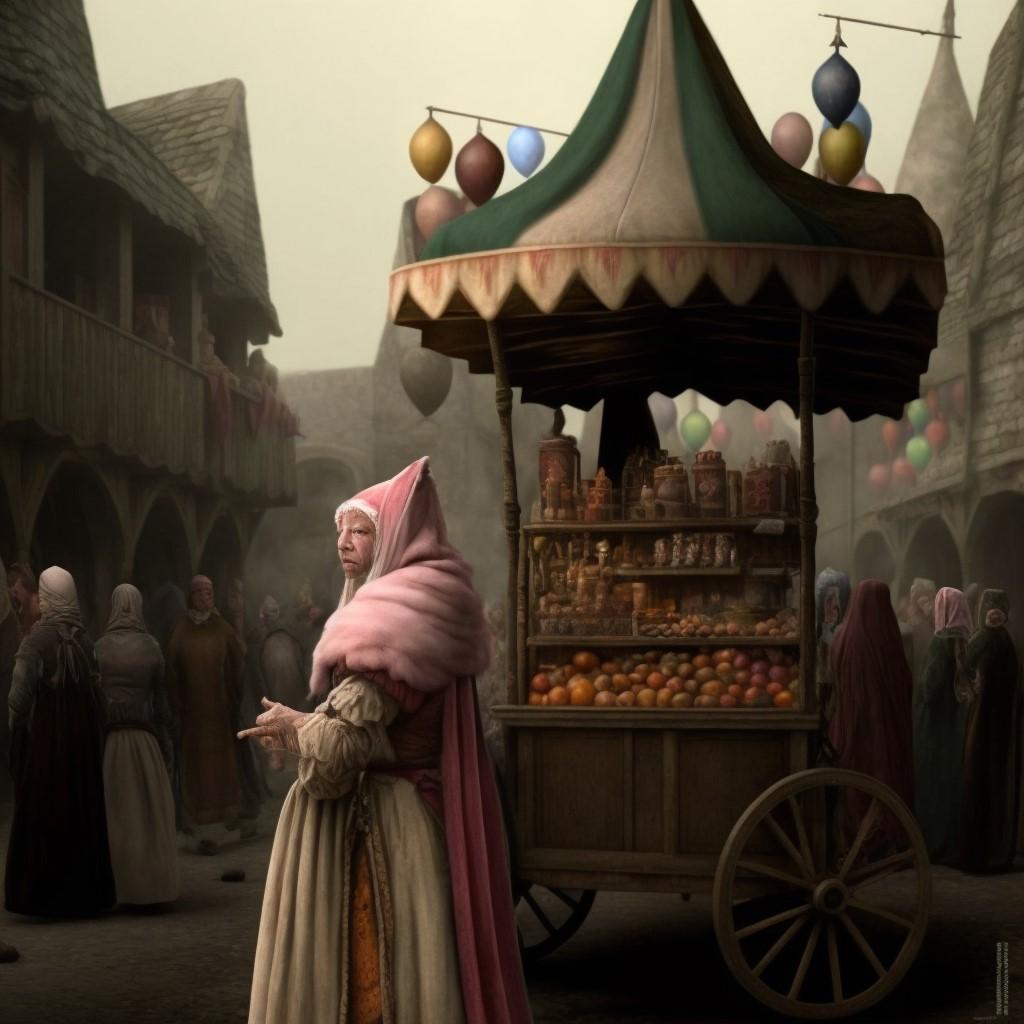
She quickly forgot what her quest was and set off wandering around the scene. Each alley led to a little square and each square had gaily coloured carts of wares for sale, and an abundance of grinning jesters and jugglers. Although tempted to linger and join the onlookers jeering and goading the jugglers and artistes that she encountered, Zara continued her ramble around the scene.
She came to a gathering outside an old market hall, where two particularly raucous jesters were trying to tempt the onlookers into partaking of what appeared to be cups of tea. Zara wondered what the joke was and why nobody in the crowd was willing to try. She inched closer, attracting the attention of the odd grinning fellow in the orange head piece.

“Come hither, ye fine wench in thy uncomely scant garments, I know what thou seekest! Pray, sit thee down beside me and partake of my remedy.”
“Who, me?” asked Zara, looking behind her to make sure he wasn’t talking to someone else.
“Thoust in dire need of my elixir, come ye hither!”
Somewhat reluctantly Zara stepped towards the odd figure who was offering to hand her a cup. She considered the inadvisability of drinking something that everyone else was refusing, but what the hell, she took the cup and saucer off him and took a hesitant sip.
The crowd roared with laughter and there was much mirthful thigh slapping when Zara spit the foul tasting concoction all over the jesters shoes.
“Believe me dame,” quoth the Jester, “I perceive proffered ware is worse by ten in the hundred than that which is sought. But I pray ye, tell me thy quest.”
“My quest is none of your business, and your tea sucks, mister,” Zara replied. “But I like the cup.”
Pushing past the still laughing onlookers and clutching the cup, Zara spotted a tavern on the opposite side of the square and made her way towards it. A tankard of ale was what she needed to get rid of the foul taste lingering in her mouth.
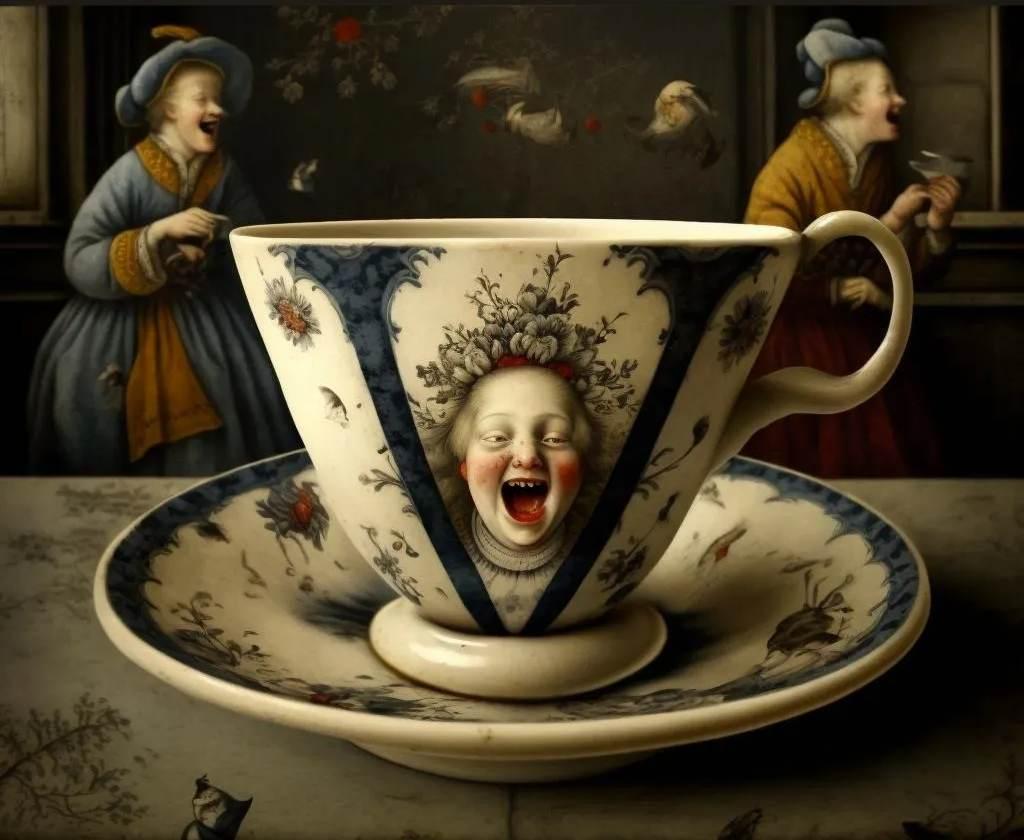
The inside of the tavern was as much a madhouse as the streets outside it. What was everyone laughing at? Zara found a place to sit on a bench beside a long wooden table. She sat patiently waiting to be served, trying to eavesdrop to decipher the cause of such merriment, but the snatches of conversation made no sense to her. The jollity was contagious, and before long Zara was laughing along with the others. A strange child sat down on the opposite bench (she seemed familiar somehow) and Zara couldn’t help remarking, “You lot are as mad as a box of frogs, are you all on drugs or something?” which provoked further hoots of laughter, thigh slapping and table thumping.
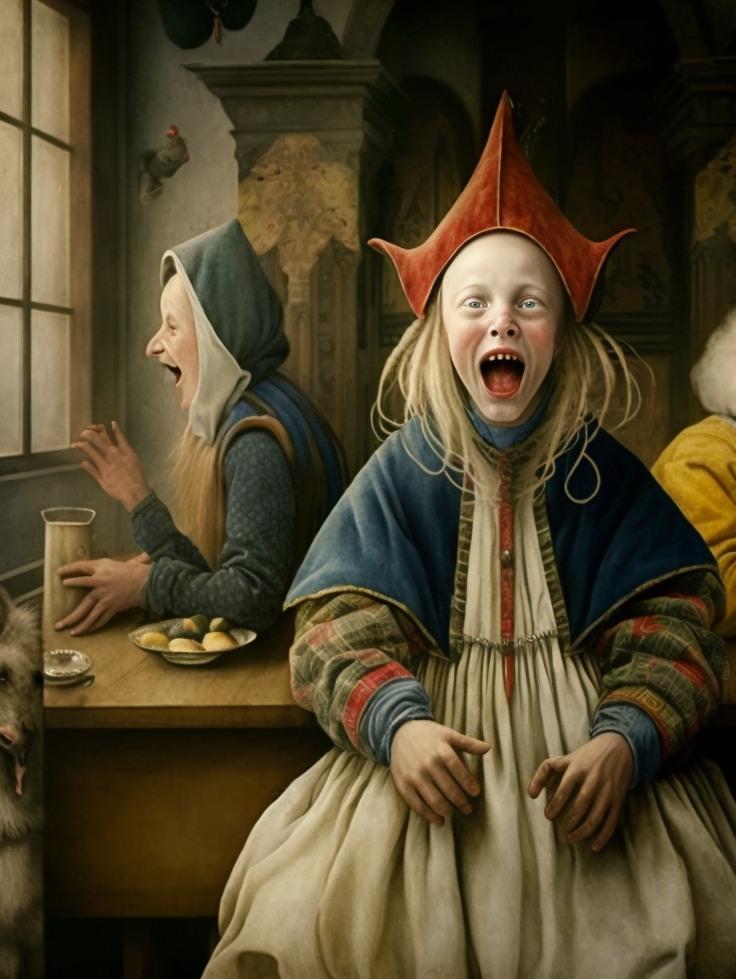
“Ye be an ungodly rude maid, and ye’ll not get a tankard of ale while thoust leavest thy cup of elixir untasted yet,” the child said with a smirk.
“And you are an impertinent child,” Zara replied, considering the potential benefits of drinking the remainder of the concoction if it would hasten the arrival of the tankard of ale she was now craving. She gritted her teeth and picked up the cup.
But the design on the cup had changed, and now bore a strange resemblance to Xavier. Not only that, the cup was calling her name in Xavier’s voice, and the table thumping got louder.

“Zara!” Xavier was knocking on her bedroom door. “Zara! We’re going for a beer in the local tavern, are you coming?”
“Xavi!” Zara snapped back to reality, “Yes! I’m bloody parched.”
January 15, 2023 at 11:42 am #6389In reply to: Newsreel from the Rim of the Realm
“What in the good name of our Lady, have these two been on?” Miss Bossy was at a loss for words while Ricardo was waiting sheepishly at her desk, as though he was expecting an outburst.
“Look, Ricardo, I’m not against a little tweaking for newsworthiness, but this takes twisting reality to a whole new level!Ricardo had just dropped their last article.
Local Hero at the Rescue – Stray Residents found after in a trip of a lifetime
article by Hilda Astoria & Continuity BrownIn a daring and heroic move, Nurse Trassie, a local hero and all-around fantastic human being, managed to track down and rescue three elderly women who had gone on an adventure of a lifetime. Sharon, Mavis, and Gloria (names may have been altered to preserve their anonymity) were residents of a UK nursing home who, in a moment of pure defiance and desire for adventure, decided to go off their meds and escape to the Nordics.
The three women, who had been feeling cooped up and underappreciated in their nursing home, decided to take matters into their own hands and embark on a journey to see the world. They had heard of the beautiful landscapes and friendly people of the Nordics and their rejuvenating traditional cures and were determined to experience it for themselves.
Their journey, however, was not without its challenges. They faced many obstacles, including harsh weather conditions and language barriers. But they were determined to press on, and their determination paid off when they were taken in by a kind-hearted local doctor who gave them asylum and helped them rehabilitate stray animals.
Nurse Trassie, who had been on the lookout for the women since their disappearance, finally caught wind of their whereabouts and set out to rescue them. She tracked them down to the Nordics, where she found them living in a small facility in the woods, surrounded by a menagerie of stray animals they had taken in and were nursing back to health, including rare orangutans retired from local circus.
Upon her arrival, Nurse Trassie was greeted with open arms by the women, who were overjoyed to see her. They told her of their adventures and showed her around their cabin, introducing her to the animals they had taken in and the progress they had made in rehabilitating them.
Nurse Trassie, who is known for her compassion and dedication to her patients, was deeply touched by the women’s story and their love for the animals. She knew that they needed to be back in the care of professionals and that the animals needed to be properly cared for, so she made arrangements to bring them back home.
The women were reluctant to leave their newfound home and the animals they had grown to love, but they knew that it was the right thing to do. They said their goodbyes and set off on the long journey back home with Nurse Trassie by their side.
The three women returned to their nursing home filled with stories to share, and Nurse Trassie was hailed as a hero for her efforts in rescuing them. They were greeted with cheers and applause from the staff and other residents, who were thrilled to have them back safe and sound.
Nurse Trassie, who is known for her sharp wit and sense of humor, commented on the situation with a tongue-in-cheek remark, “It’s not every day that you get to rescue three feisty elderlies from the wilds of the Nordics and bring them back to safety. I’m just glad I could be of service.”
In conclusion, the three women’s adventure in the Nordics may have been unorthodox, but it was an adventure nonetheless. They were able to see the world and help some animals in the process. Their story serves as a reminder to never give up on your dreams, no matter your age or circumstances. And of course, a big shoutout to Nurse Trassie for her heroic actions and dedication to her patients.
Bossy sighed. “It might do for now, but don’t let those two abuse the artificial intelligence to write article for them… I liked their old style better. This feels too… tidy. We’re not the A-News network, let’s not forget our purpose.”
Ricardo nodded. Miss Bossy had been more mellow since the sales of the newspaper had exploded during the pandemic. With people at home, looking for conspiracies and all, the newspaper had known a resurgence of interest, and they even had to hire new staff. Giles Gibber, Glimmer Gambol (came heavily recommended by Blithe, the PI friend of Hilda’s), Samuel Sproink and Fionna Flibbergibbet.
“And how is Sophie? That adventure into her past trauma was a bit much on her…” she mused.
“She’s doing alright” answered Ricardo. “She’s learning to hone her remote-viewing skills to send our staff into new mysteries to solve. With a bit of AI assist…”
“Oh, stop it already with your AI-this, AI-that! Hope there’ll still be room for some madness in all that neatly tidy purring of polite output.”
“That’s why we’re here for, I reckon.” Ric’ smiled wryly.
January 10, 2023 at 10:15 pm #6363In reply to: Train your subjective AI – text version
try another short story, with a bit of drama with the following words:
road form charlton smooth everyone cottage hanging rush offer agree subject district included appear sha returning grattidge nottingham 848 tetbury chicken
It was a cold and gloomy day in the small village of Tetbury, nestled in the picturesque Cotswolds district. A young woman named Sha was returning home to her cottage after a long and tiring journey. She had been away visiting her family in Nottingham and was looking forward to relaxing in her cozy home.
As she walked down the dirt road that led to her cottage, she couldn’t help but notice that something was off. Her neighbor, Mr. Charlton, was outside hanging laundry and he didn’t acknowledge her as she walked by. Sha thought it was strange, as he was usually a friendly and sociable person.
When Sha arrived at her cottage, she was shocked to find that it had been broken into. The front door was ajar and the inside of her home had been ransacked. Sha immediately panicked and called the police, who arrived on the scene shortly thereafter.
The police officers, including Inspector Grattidge, took Sha’s statement and began to investigate the crime. They discovered that a group of burglars had been operating in the area, targeting homes and businesses in the district. The burglars had been known for their smooth operations and their ability to strike quickly, which led to their nickname “The Smooth Operators”.
As Sha waited for the police to finish their investigation, she couldn’t shake the feeling that something was not right. She had always thought of Tetbury as a safe and friendly place, and she couldn’t believe that something like this could happen in her community.
As the investigation went on, the police found out that the Smooth operators have been targeting houses with no security cameras, but Sha’s cottage was an exception, the police were able to find out that the group offered to pay a considerable sum of money to the people who reported the locations of the houses that had no cameras, and it was Mr. Charlton who was the informant and he even rushed to Sha’s cottage as soon as he knew the police was investigating the case, He was arrested for the crime and Sha was heartbroken to find out that her once friendly neighbor had betrayed her.
Feeling violated and betrayed, Sha decided that she could no longer stay in the village and she put her cottage up for sale. She packed up her belongings and moved away, leaving behind the memories of her peaceful home and the community she had once thought of as her own. The end.
July 1, 2022 at 9:51 am #6306In reply to: The Elusive Samuel Housley and Other Family Stories
Looking for Robert Staley
William Warren (1835-1880) of Newhall (Stapenhill) married Elizabeth Staley (1836-1907) in 1858. Elizabeth was born in Newhall, the daughter of John Staley (1795-1876) and Jane Brothers. John was born in Newhall, and Jane was born in Armagh, Ireland, and they were married in Armagh in 1820. Elizabeths older brothers were born in Ireland: William in 1826 and Thomas in Dublin in 1830. Francis was born in Liverpool in 1834, and then Elizabeth in Newhall in 1836; thereafter the children were born in Newhall.
Marriage of John Staley and Jane Brothers in 1820:

My grandmother related a story about an Elizabeth Staley who ran away from boarding school and eloped to Ireland, but later returned. The only Irish connection found so far is Jane Brothers, so perhaps she meant Elizabeth Staley’s mother. A boarding school seems unlikely, and it would seem that it was John Staley who went to Ireland.
The 1841 census states Jane’s age as 33, which would make her just 12 at the time of her marriage. The 1851 census states her age as 44, making her 13 at the time of her 1820 marriage, and the 1861 census estimates her birth year as a more likely 1804. Birth records in Ireland for her have not been found. It’s possible, perhaps, that she was in service in the Newhall area as a teenager (more likely than boarding school), and that John and Jane ran off to get married in Ireland, although I haven’t found any record of a child born to them early in their marriage. John was an agricultural labourer, and later a coal miner.
John Staley was the son of Joseph Staley (1756-1838) and Sarah Dumolo (1764-). Joseph and Sarah were married by licence in Newhall in 1782. Joseph was a carpenter on the marriage licence, but later a collier (although not necessarily a miner).
The Derbyshire Record Office holds records of an “Estimate of Joseph Staley of Newhall for the cost of continuing to work Pisternhill Colliery” dated 1820 and addresssed to Mr Bloud at Calke Abbey (presumably the owner of the mine)
Josephs parents were Robert Staley and Elizabeth. I couldn’t find a baptism or birth record for Robert Staley. Other trees on an ancestry site had his birth in Elton, but with no supporting documents. Robert, as stated in his 1795 will, was a Yeoman.
“Yeoman: A former class of small freeholders who farm their own land; a commoner of good standing.”
“Husbandman: The old word for a farmer below the rank of yeoman. A husbandman usually held his land by copyhold or leasehold tenure and may be regarded as the ‘average farmer in his locality’. The words ‘yeoman’ and ‘husbandman’ were gradually replaced in the later 18th and 19th centuries by ‘farmer’.”He left a number of properties in Newhall and Hartshorne (near Newhall) including dwellings, enclosures, orchards, various yards, barns and acreages. It seemed to me more likely that he had inherited them, rather than moving into the village and buying them.
There is a mention of Robert Staley in a 1782 newpaper advertisement.
“Fire Engine To Be Sold. An exceedingly good fire engine, with the boiler, cylinder, etc in good condition. For particulars apply to Mr Burslem at Burton-upon-Trent, or Robert Staley at Newhall near Burton, where the engine may be seen.”

Was the fire engine perhaps connected with a foundry or a coal mine?
I noticed that Robert Staley was the witness at a 1755 marriage in Stapenhill between Barbara Burslem and Richard Daston the younger esquire. The other witness was signed Burslem Jnr.
Looking for Robert Staley
I assumed that once again, in the absence of the correct records, a similarly named and aged persons baptism had been added to the tree regardless of accuracy, so I looked through the Stapenhill/Newhall parish register images page by page. There were no Staleys in Newhall at all in the early 1700s, so it seemed that Robert did come from elsewhere and I expected to find the Staleys in a neighbouring parish. But I still didn’t find any Staleys.
I spoke to a couple of Staley descendants that I’d met during the family research. I met Carole via a DNA match some months previously and contacted her to ask about the Staleys in Elton. She also had Robert Staley born in Elton (indeed, there were many Staleys in Elton) but she didn’t have any documentation for his birth, and we decided to collaborate and try and find out more.
I couldn’t find the earlier Elton parish registers anywhere online, but eventually found the untranscribed microfiche images of the Bishops Transcripts for Elton.
via familysearch:
“In its most basic sense, a bishop’s transcript is a copy of a parish register. As bishop’s transcripts generally contain more or less the same information as parish registers, they are an invaluable resource when a parish register has been damaged, destroyed, or otherwise lost. Bishop’s transcripts are often of value even when parish registers exist, as priests often recorded either additional or different information in their transcripts than they did in the original registers.”Unfortunately there was a gap in the Bishops Transcripts between 1704 and 1711 ~ exactly where I needed to look. I subsequently found out that the Elton registers were incomplete as they had been damaged by fire.
I estimated Robert Staleys date of birth between 1710 and 1715. He died in 1795, and his son Daniel died in 1805: both of these wills were found online. Daniel married Mary Moon in Stapenhill in 1762, making a likely birth date for Daniel around 1740.
The marriage of Robert Staley (assuming this was Robert’s father) and Alice Maceland (or Marsland or Marsden, depending on how the parish clerk chose to spell it presumably) was in the Bishops Transcripts for Elton in 1704. They were married in Elton on 26th February. There followed the missing parish register pages and in all likelihood the records of the baptisms of their first children. No doubt Robert was one of them, probably the first male child.
(Incidentally, my grandfather’s Marshalls also came from Elton, a small Derbyshire village near Matlock. The Staley’s are on my grandmothers Warren side.)
The parish register pages resume in 1711. One of the first entries was the baptism of Robert Staley in 1711, parents Thomas and Ann. This was surely the one we were looking for, and Roberts parents weren’t Robert and Alice.
But then in 1735 a marriage was recorded between Robert son of Robert Staley (and this was unusual, the father of the groom isn’t usually recorded on the parish register) and Elizabeth Milner. They were married on the 9th March 1735. We know that the Robert we were looking for married an Elizabeth, as her name was on the Stapenhill baptisms of their later children, including Joseph Staleys. The 1735 marriage also fit with the assumed birth date of Daniel, circa 1740. A baptism was found for a Robert Staley in 1738 in the Elton registers, parents Robert and Elizabeth, as well as the baptism in 1736 for Mary, presumably their first child. Her burial is recorded the following year.
The marriage of Robert Staley and Elizabeth Milner in 1735:

There were several other Staley couples of a similar age in Elton, perhaps brothers and cousins. It seemed that Thomas and Ann’s son Robert was a different Robert, and that the one we were looking for was prior to that and on the missing pages.
Even so, this doesn’t prove that it was Elizabeth Staleys great grandfather who was born in Elton, but no other birth or baptism for Robert Staley has been found. It doesn’t explain why the Staleys moved to Stapenhill either, although the Enclosures Act and the Industrial Revolution could have been factors.
The 18th century saw the rise of the Industrial Revolution and many renowned Derbyshire Industrialists emerged. They created the turning point from what was until then a largely rural economy, to the development of townships based on factory production methods.
The Marsden Connection
There are some possible clues in the records of the Marsden family. Robert Staley married Alice Marsden (or Maceland or Marsland) in Elton in 1704. Robert Staley is mentioned in the 1730 will of John Marsden senior, of Baslow, Innkeeper (Peacock Inne & Whitlands Farm). He mentions his daughter Alice, wife of Robert Staley.
In a 1715 Marsden will there is an intriguing mention of an alias, which might explain the different spellings on various records for the name Marsden: “MARSDEN alias MASLAND, Christopher – of Baslow, husbandman, 28 Dec 1714. son Robert MARSDEN alias MASLAND….” etc.
Some potential reasons for a move from one parish to another are explained in this history of the Marsden family, and indeed this could relate to Robert Staley as he married into the Marsden family and his wife was a beneficiary of a Marsden will. The Chatsworth Estate, at various times, bought a number of farms in order to extend the park.
THE MARSDEN FAMILY
OXCLOSE AND PARKGATE
In the Parishes of
Baslow and Chatsworthby
David Dalrymple-Smith“John Marsden (b1653) another son of Edmund (b1611) faired well. By the time he died in
1730 he was publican of the Peacock, the Inn on Church Lane now called the Cavendish
Hotel, and the farmer at “Whitlands”, almost certainly Bubnell Cliff Farm.”“Coal mining was well known in the Chesterfield area. The coalfield extends as far as the
Gritstone edges, where thin seams outcrop especially in the Baslow area.”“…the occupants were evicted from the farmland below Dobb Edge and
the ground carefully cleared of all traces of occupation and farming. Shelter belts were
planted especially along the Heathy Lea Brook. An imposing new drive was laid to the
Chatsworth House with the Lodges and “The Golden Gates” at its northern end….”Although this particular event was later than any events relating to Robert Staley, it’s an indication of how farms and farmland disappeared, and a reason for families to move to another area:
“The Dukes of Devonshire (of Chatsworth) were major figures in the aristocracy and the government of the
time. Such a position demanded a display of wealth and ostentation. The 6th Duke of
Devonshire, the Bachelor Duke, was not content with the Chatsworth he inherited in 1811,
and immediately started improvements. After major changes around Edensor, he turned his
attention at the north end of the Park. In 1820 plans were made extend the Park up to the
Baslow parish boundary. As this would involve the destruction of most of the Farm at
Oxclose, the farmer at the Higher House Samuel Marsden (b1755) was given the tenancy of
Ewe Close a large farm near Bakewell.
Plans were revised in 1824 when the Dukes of Devonshire and Rutland “Exchanged Lands”,
reputedly during a game of dice. Over 3300 acres were involved in several local parishes, of
which 1000 acres were in Baslow. In the deal Devonshire acquired the southeast corner of
Baslow Parish.
Part of the deal was Gibbet Moor, which was developed for “Sport”. The shelf of land
between Parkgate and Robin Hood and a few extra fields was left untouched. The rest,
between Dobb Edge and Baslow, was agricultural land with farms, fields and houses. It was
this last part that gave the Duke the opportunity to improve the Park beyond his earlier
expectations.”The 1795 will of Robert Staley.
Inriguingly, Robert included the children of his son Daniel Staley in his will, but omitted to leave anything to Daniel. A perusal of Daniels 1808 will sheds some light on this: Daniel left his property to his six reputed children with Elizabeth Moon, and his reputed daughter Mary Brearly. Daniels wife was Mary Moon, Elizabeths husband William Moons daughter.
The will of Robert Staley, 1795:


The 1805 will of Daniel Staley, Robert’s son:
This is the last will and testament of me Daniel Staley of the Township of Newhall in the parish of Stapenhill in the County of Derby, Farmer. I will and order all of my just debts, funeral and testamentary expenses to be fully paid and satisfied by my executors hereinafter named by and out of my personal estate as soon as conveniently may be after my decease.
I give, devise and bequeath to Humphrey Trafford Nadin of Church Gresely in the said County of Derby Esquire and John Wilkinson of Newhall aforesaid yeoman all my messuages, lands, tenements, hereditaments and real and personal estates to hold to them, their heirs, executors, administrators and assigns until Richard Moon the youngest of my reputed sons by Elizabeth Moon shall attain his age of twenty one years upon trust that they, my said trustees, (or the survivor of them, his heirs, executors, administrators or assigns), shall and do manage and carry on my farm at Newhall aforesaid and pay and apply the rents, issues and profits of all and every of my said real and personal estates in for and towards the support, maintenance and education of all my reputed children by the said Elizabeth Moon until the said Richard Moon my youngest reputed son shall attain his said age of twenty one years and equally share and share and share alike.
And it is my will and desire that my said trustees or trustee for the time being shall recruit and keep up the stock upon my farm as they in their discretion shall see occasion or think proper and that the same shall not be diminished. And in case any of my said reputed children by the said Elizabeth Moon shall be married before my said reputed youngest son shall attain his age of twenty one years that then it is my will and desire that non of their husbands or wives shall come to my farm or be maintained there or have their abode there. That it is also my will and desire in case my reputed children or any of them shall not be steady to business but instead shall be wild and diminish the stock that then my said trustees or trustee for the time being shall have full power and authority in their discretion to sell and dispose of all or any part of my said personal estate and to put out the money arising from the sale thereof to interest and to pay and apply the interest thereof and also thereunto of the said real estate in for and towards the maintenance, education and support of all my said reputed children by the said
Elizabeth Moon as they my said trustees in their discretion that think proper until the said Richard Moon shall attain his age of twenty one years.Then I give to my grandson Daniel Staley the sum of ten pounds and to each and every of my sons and daughters namely Daniel Staley, Benjamin Staley, John Staley, William Staley, Elizabeth Dent and Sarah Orme and to my niece Ann Brearly the sum of five pounds apiece.
I give to my youngest reputed son Richard Moon one share in the Ashby Canal Navigation and I direct that my said trustees or trustee for the time being shall have full power and authority to pay and apply all or any part of the fortune or legacy hereby intended for my youngest reputed son Richard Moon in placing him out to any trade, business or profession as they in their discretion shall think proper.
And I direct that to my said sons and daughters by my late wife and my said niece shall by wholly paid by my said reputed son Richard Moon out of the fortune herby given him. And it is my will and desire that my said reputed children shall deliver into the hands of my executors all the monies that shall arise from the carrying on of my business that is not wanted to carry on the same unto my acting executor and shall keep a just and true account of all disbursements and receipts of the said business and deliver up the same to my acting executor in order that there may not be any embezzlement or defraud amongst them and from and immediately after my said reputed youngest son Richard Moon shall attain his age of twenty one years then I give, devise and bequeath all my real estate and all the residue and remainder of my personal estate of what nature and kind whatsoever and wheresoever unto and amongst all and every my said reputed sons and daughters namely William Moon, Thomas Moon, Joseph Moon, Richard Moon, Ann Moon, Margaret Moon and to my reputed daughter Mary Brearly to hold to them and their respective heirs, executors, administrator and assigns for ever according to the nature and tenure of the same estates respectively to take the same as tenants in common and not as joint tenants.And lastly I nominate and appoint the said Humphrey Trafford Nadin and John Wilkinson executors of this my last will and testament and guardians of all my reputed children who are under age during their respective minorities hereby revoking all former and other wills by me heretofore made and declaring this only to be my last will.
In witness whereof I the said Daniel Staley the testator have to this my last will and testament set my hand and seal the eleventh day of March in the year of our Lord one thousand eight hundred and five.
March 4, 2022 at 2:58 pm #6280In reply to: The Whale’s Diaries Collection
I started reading a book. In fact I started reading it three weeks ago, and have read the first page of the preface every night and fallen asleep. But my neck aches from doing too much gardening so I went back to bed to read this morning. I still fell asleep six times but at least I finished the preface. It’s the story of the family , initiated by the family collection of netsuke (whatever that is. Tiny Japanese carvings) But this is what stopped me reading and made me think (and then fall asleep each time I re read it)
“And I’m not entitled to nostalgia about all that lost wealth and glamour from a century ago. And I am not interested in thin. I want to know what the relationship has been between this wooden object that I am rolling between my fingers – hard and tricky and Japanese – and where it has been. I want to be able to reach to the handle of the door and turn it and feel it open. I want to walk into each room where this object has lived, to feel the volume of the space, to know what pictures were on the walls, how the light fell from the windows. And I want to know whose hands it has been in, and what they felt about it and thought about it – if they thought about it. I want to know what it has witnessed.” ― Edmund de Waal, The Hare With Amber Eyes: A Family’s Century of Art and Loss
And I felt almost bereft that none of the records tell me which way the light fell in through the windows.
I know who lived in the house in which years, but I don’t know who sat in the sun streaming through the window and which painting upon the wall they looked at and what the material was that covered the chair they sat on.
Were his clothes confortable (or hers, likely not), did he have an old favourite pair of trousers that his mother hated?
There is one house in particular that I keep coming back to. Like I got on the Housley train at Smalley and I can’t get off. Kidsley Grange Farm, they turned it into a nursing home and built extensions, and now it’s for sale for five hundred thousand pounds. But is the ghost still under the back stairs? Is there still a stain somewhere when a carafe of port was dropped?
Did Anns writing desk survive? Does someone have that, polished, with a vase of spring tulips on it? (on a mat of course so it doesn’t make a ring, despite that there are layers of beeswaxed rings already)
Does the desk remember the letters, the weight of a forearm or elbow, perhaps a smeared teardrop, or a comsumptive cough stain?
Is there perhaps a folded bit of paper or card that propped an uneven leg that fell through the floorboards that might tear into little squares if you found it and opened it, and would it be a rough draft of a letter never sent, or just a receipt for five head of cattle the summer before?
Did he hate the curtain material, or not even think of it? Did he love the house, or want to get away to see something new ~ or both?
Did he have a favourite cup, a favourite food, did he hate liver or cabbage?
Did he like his image when the photograph came from the studio or did he think it made his nose look big or his hair too thin, or did he wish he’d worn his other waistcoat?
Did he love his wife so much he couldn’t bear to see her dying, was it neglect or was it the unbearableness of it all that made him go away and drink?
Did the sun slanting in through the dormer window of his tiny attic room where he lodged remind him of ~ well no perhaps he was never in the room in daylight hours at all. Work all day and pub all night, keeping busy working hard and drinking hard and perhaps laughing hard, and maybe he only thought of it all on Sunday mornings.
So many deaths, one after another, his father, his wife, his brother, his sister, and another and another, all the coughing, all the debility. Perhaps he never understood why he lived and they did not, what kind of justice was there in that?
Did he take a souvenir or two with him, a handkerchief or a shawl perhaps, tucked away at the bottom of a battered leather bag that had his 3 shirts and 2 waistcoats in and a spare cap,something embroidered perhaps.
The quote in that book started me off with the light coming in the window and the need to know the simplest things, something nobody ever wrote in a letter, maybe never even mentioned to anyone.
Light coming in windows. I remeber when I was a teenager I had a day off sick and spent the whole day laying on the couch in a big window with the winter sun on my face all day, and I read Bonjour Tristesse in one sitting, and I’ll never forget that afternoon. I don’t remember much about that book, but I remember being transported. But at the same time as being present in that sunny window.
“Stories and objects share something, a patina…Perhaps patina is a process of rubbing back so that the essential is revealed…But it also seems additive, in the way that a piece of oak furniture gains over years and years of polishing.”
“How objects are handed on is all about story-telling. I am giving you this because I love you. Or because it was given to me. Because I bought it somewhere special. Because you will care for it. Because it will complicate your life. Because it will make someone else envious. There is no easy story in legacy. What is remembered and what is forgotten? There can be a chain of forgetting, the rubbing away of previous ownership as much as the slow accretion of stories. What is being passed on to me with all these small Japanese objects?”
“There are things in this world that the children hear, but whose sounds oscillate below an adult’s sense of pitch.”
What did the children hear?
-
AuthorSearch Results